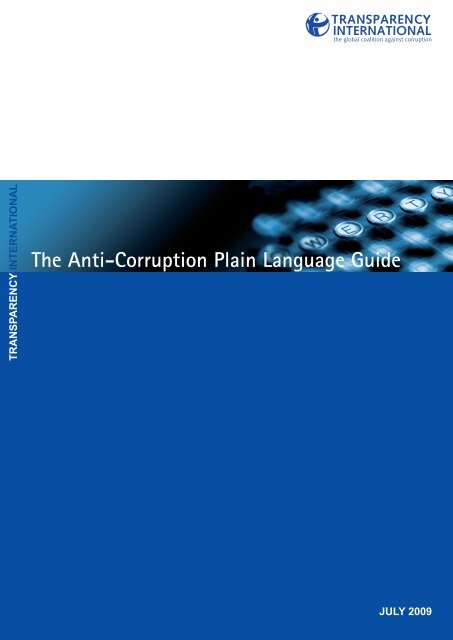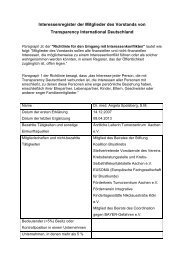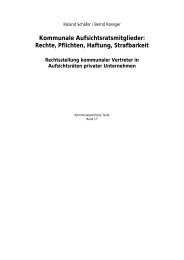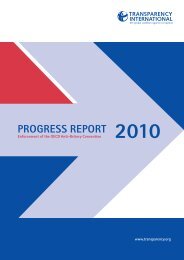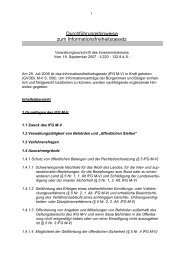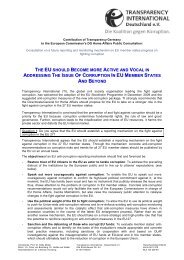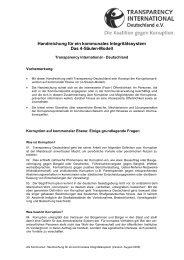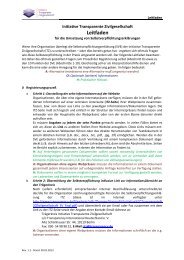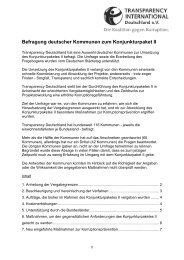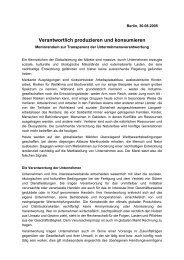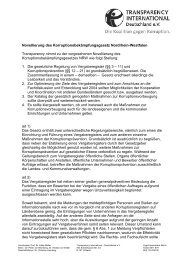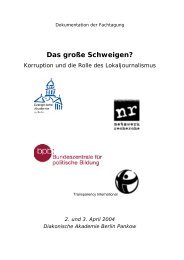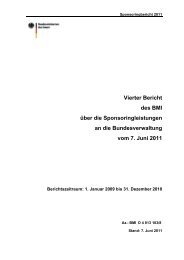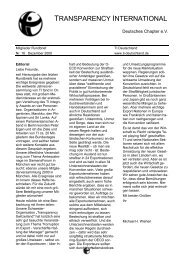The Anti-Corruption Plain Language Guide - Transparency ...
The Anti-Corruption Plain Language Guide - Transparency ...
The Anti-Corruption Plain Language Guide - Transparency ...
Create successful ePaper yourself
Turn your PDF publications into a flip-book with our unique Google optimized e-Paper software.
TRANSPARENCY INTERNATIONAL<br />
<strong>The</strong> <strong>Anti</strong>-<strong>Corruption</strong> <strong>Plain</strong> <strong>Language</strong> <strong>Guide</strong><br />
JULY 2009
www.transparency.org<br />
Acknowledgements:<br />
TI would like to thank all the national chapters, members and partners that have helped make this guide<br />
a reality. With what began as an incipient idea among TI members, the guide has progressed quickly<br />
from its beginning as a small meeting prior to the International <strong>Anti</strong>-<strong>Corruption</strong> Conference (IACC) in<br />
October 2008. This early morning session gained tremendously from the contributions of Finn Heinrich,<br />
Christian Humborg, Pierre Landell Mills, Farzana Nawaz, Georg Neumann, Juanita Riaño, Bruno Speck,<br />
Codru Vrabi and Peter Wilkinson. It has helped to set the tone for all the work that has followed under<br />
the guidance of Craig Fagan (TI).<br />
TI would particularly like to thank Amaya Gorostiaga, who has translated the original vision for the guide<br />
into such an excellent text. Also, the inputs of Casey Kelso and the design skills of Renate Trowers have<br />
been invaluable.<br />
Throughout this process, the work of TI’s national chapters has been critical. TI would like to recognise<br />
the contributions of chapters in Bangladesh, Kenya, Lebanon, Romania, South Korea and Zambia that<br />
helped to pilot the guide with key stakeholders from the government, parliament, private sector, civil<br />
society and media. This guide reflects their valuable inputs and demand to have a practical tool to support<br />
locally and globally the anti-corruption work of TI.<br />
© 2009 <strong>Transparency</strong> International. All rights reserved.
Foreword:<br />
While the world is not free from corruption, it is a very different place than when <strong>Transparency</strong> International began<br />
its work more than 15 years ago. <strong>The</strong>re has been a marked increase in the understanding of corruption’s ills and<br />
the need to prevent, mitigate and combat it. Yet the financial and economic crisis in 2008 has served as a reminder<br />
of what can happen when transparency, accountability and anti-corruption become afterthoughts rather than the<br />
guide for one’s actions.<br />
Having a common understanding and language for the anti-corruption movement is one channel for ensuring that<br />
such breakdowns and abuses are prevented in the future. It is in this spirit that this plain language guide has been<br />
developed to capture the key terms and their meanings for TI and to provide the anti-corruption movement with a<br />
resource to work more effectively with government, private sector and civil society stakeholders.<br />
Introduction:<br />
<strong>Corruption</strong> and its effects are a global dilemma. From small bribes paid to police officers in Bangladesh to the holding<br />
of stolen assets by banks, the impacts from these abuses on states and citizens are the same: the undermining<br />
of the rule of law, the violation of rights, opaque institutions, lost public resources and weakened national integrity.<br />
To effectively address these problems, anti-corruption solutions need to be pursued through coordinated and deliberate<br />
action by international, national and local partners that use the same language and agree on its meaning.<br />
In response, TI has developed the first “<strong>Anti</strong>-<strong>Corruption</strong> <strong>Plain</strong> <strong>Language</strong> <strong>Guide</strong>”. <strong>The</strong> <strong>Plain</strong> <strong>Language</strong> <strong>Guide</strong> offers a<br />
set of standardised, easy-to-understand definitions, providing readers with concrete examples in practice of how TI<br />
approaches these issues. Relevant links are also provided for further background information or research.<br />
<strong>The</strong> aim of the guide is to provide clarity on the terms that the anti-corruption movement uses most in its daily work<br />
as well as those associated with new and emerging issues. <strong>The</strong> terms in this guide have been selected given their<br />
wide use in diverse forums and across the public and private sectors. Each term is intended to stimulate a dialogue<br />
— within academia, by the business community, among governments and parliamentarians, by NGOs and the media,<br />
and in international development circles — on how to address corruption.<br />
<strong>The</strong> experiences of TI chapters in over 90 countries have formed the basis for this guide, the terms selected and<br />
the definitions used. <strong>The</strong> guide is the result of the collaborative efforts of a number of <strong>Transparency</strong> International<br />
chapters across different regions. It reflects the extensive consultations that they held with local stakeholders to<br />
devise a short list of terms and definitions that can be understood across different cultures, languages and contexts.<br />
Many of these terms are in continual evolution as the anti-corruption movement works to better understand what<br />
is ‘governance’, ‘civil society’ or even ‘corruption’.<br />
<strong>The</strong> guide serves as a platform for continuing this discussion as the movement evolves, grows and continues to learn.<br />
It is a living document that will be debated, expanded and updated.<br />
We look forward to your continued help in this process.
List of Terms<br />
Access to Information 1<br />
Accountability 2<br />
Asset Recovery 3<br />
Audit 4<br />
Bribery 5<br />
Civil Society 6<br />
Clientelism 7<br />
Code of Conduct 8<br />
Collusion 9<br />
Compliance 10<br />
Conflict of Interest 11<br />
Conventions 12<br />
Corporate Governance 13<br />
<strong>Corruption</strong> 14<br />
Debarment 15<br />
Disclosure 16<br />
Embezzlement 17<br />
Ethics 18<br />
Extortion 19<br />
Facilitation Payments 20<br />
Fraud 21<br />
Governance 22<br />
Grand <strong>Corruption</strong> 23<br />
Integrity 24<br />
Lobbying 25<br />
Money Laundering 26<br />
National Integrity Systems 27<br />
Nepotism 28<br />
Offshore Financial Centres 29<br />
Oversight 30<br />
Pacts 31<br />
Patronage 32<br />
Petty <strong>Corruption</strong> 33<br />
Political Contribution 34<br />
Political <strong>Corruption</strong> 35<br />
Political Will 36<br />
Private Sector 37<br />
Procurement 38<br />
Public Sector 39<br />
Revolving Door 40<br />
Rule of Law 41<br />
Solicitation 42<br />
State Capture 43<br />
<strong>Transparency</strong> 44<br />
Whistle Blowing 45
Access to Information<br />
Definition<br />
<strong>The</strong> right by law — often through freedom of information legislation (acts or laws) — to<br />
access key facts and data from the government and any public body. Budgets, project<br />
approvals and evaluations are typically published although citizens can petition for more<br />
materials to be released. 1<br />
Example in practice<br />
Canada’s Access to Information Act allows citizens to request online any public record from<br />
a federal body, 2 with the exception of documents considered threatening to the security,<br />
economic, domestic, or international affairs of the country.<br />
Relevant links<br />
—— Article 19 Global Campaign for Free Expression.<br />
www.article19.org/work/index.html<br />
—— International Freedom of Expression.<br />
www.ifex.org<br />
—— UNDP Practical Guidance Note on the Right to Information.<br />
www.undp.org/governance/docs/A2I_<strong>Guide</strong>s_RighttoInformation.pdf<br />
1<br />
TRANSPARENCY INTERNATIONAL PLAIN LANGUAGE GUIDE - JULY 2009
Accountability<br />
Definition<br />
<strong>The</strong> concept that individuals, agencies and organisations (public, private and civil society)<br />
are held responsible for executing their powers properly. 3<br />
In theory, there are three forms of accountability: diagonal, horizontal and vertical. <strong>The</strong><br />
following examples apply to the public sector.<br />
Diagonal accountability is when citizens use government institutions to elicit better<br />
oversight of the state’s actions, and in the process engage in policy-making, budgeting,<br />
expenditure tracking and other activities.<br />
Horizontal accountability subjects public officials to restraint and oversight, or ‘checks<br />
and balances’ by other government agencies (i.e. courts, ombudsman, auditing agencies,<br />
central banks) that can call into question, and eventually punish, an official for improper<br />
conduct.<br />
Vertical accountability holds a public official accountable to the electorate or citizenry<br />
through elections, a free press, an active civil society and other similar channels.<br />
Example in practice<br />
In Costa Rica, the existence of three branches of government, as well as two autonomous<br />
state authorities with equivalent responsibilities (electoral and auditory branches), has<br />
created horizontal accountability and allowed for a separation of powers among state<br />
agencies, which are constitutionally empowered to take action against one another when<br />
required.<br />
Relevant links<br />
—— AccountAbility.<br />
www.accountability21.net/<br />
—— International Budget Partnership.<br />
www.internationalbudget.org/<br />
—— National Endowment for Democracy: Institutionalizing Horizontal Accountability.<br />
www.ned.org/forum/reports/accountability/report.html<br />
2<br />
TRANSPARENCY INTERNATIONAL PLAIN LANGUAGE GUIDE - JULY 2009
Asset Recovery<br />
Definition<br />
<strong>The</strong> legal process of a country, government and/or its citizens to recover state resources<br />
stolen through corruption by current and past regimes, their families and political allies, or<br />
foreign actors. 4<br />
Example in practice<br />
In February 2009, the Swiss courts ruled that US$ 6 million in assets allegedly stolen by<br />
former Haitian President Jean-Claude Duvalier and held in Switzerland’s banks should be<br />
returned to the island nation after the account holders failed to prove that their funds were<br />
acquired ‘legitimately’. 5<br />
Relevant links<br />
—— <strong>The</strong> Camden Assets Recovery Inter-Agency Network (CARIN).<br />
www.europol.europa.eu/publications/Camden_Assets_Recovery_Inter—<br />
Agency_Network/CARIN_Europol.pdf<br />
—— International Centre for Asset Recovery: Basel Institute on Governance.<br />
www.baselgovernance.org/icar/<br />
—— UNODC: Open-ended International Working Group on Asset Recovery.<br />
www.unodc.org/unodc/en/treaties/CAC/working-group2.html<br />
—— World Bank: Stolen Asset Recovery (StAR) Initiative.<br />
http://siteresources.worldbank.org/NEWS/Resources/Star-rep-full.pdf<br />
3<br />
TRANSPARENCY INTERNATIONAL PLAIN LANGUAGE GUIDE - JULY 2009
Audit<br />
Definition<br />
An internal or external examination of an organisation’s accounts, processes, functions and<br />
performance to produce an independent and credible assessment of their compliance with<br />
applicable laws, regulations and audits. 6<br />
Example in practice<br />
Indonesia’s Supreme Audit Agency found US$ 40 million missing from post-Tsunami<br />
emergency funds and massive irregularities, including that the bulk of materials bought<br />
went unused and many purchases were made long after the emergency period was over. 7<br />
’Social’ or community’ audits, where local citizens tracked whether aid was delivered, were<br />
also conducted by recipient villages in Indonesia.<br />
Relevant links<br />
—— Institute of Internal Auditors (IIA).<br />
www.theiiaa.org<br />
—— INTOSAI (International Organization of Supreme Audit Institutions).<br />
www.intosai.org/en/portal/<br />
—— ISSAI (International Standards of Supreme Audit Institutions).<br />
www.issai.org/composite-347.htm<br />
—— PEFA (Public Expenditure and Financial Accountability).<br />
www.pefa.org/<br />
4<br />
TRANSPARENCY INTERNATIONAL PLAIN LANGUAGE GUIDE - JULY 2009
Bribery<br />
Definition<br />
<strong>The</strong> offering, promising, giving, accepting or soliciting of an advantage as an inducement<br />
for an action which is illegal, unethical or a breach of trust. Inducements can take the form<br />
of gifts, loans, fees, rewards or other advantages (taxes, services, donations, etc.). 8<br />
Example in practice<br />
More than 15 percent of respondents to a national household survey in Guatemala reported<br />
that they paid a bribe when trying to (re)connect to the public water system. 9 In<br />
Bangladesh, 64,5 percent of citizens in a national survey responded that they paid a bribe<br />
when interacting with law enforcement agencies. Bribery across all agencies in Bangladesh<br />
is estimated to reduce the country’s national income by 3,84 percent. 10<br />
Relevant links<br />
—— OECD <strong>Anti</strong>-Bribery Convention.<br />
www.oecd.org/department/0,3355,en_2649_34859_1_1_1_1_1,00.html<br />
——<strong>Transparency</strong> International’s Bribe Payers Index.<br />
www.transparency.org/policy_research/surveys_indices/bpi<br />
——<strong>Transparency</strong> International’s Business Principles for Countering Bribery.<br />
www.transparency.org/global_priorities/private_sector/business_principles<br />
5<br />
TRANSPARENCY INTERNATIONAL PLAIN LANGUAGE GUIDE - JULY 2009
Civil Society<br />
Definition<br />
<strong>The</strong> arena, outside of the family, state and market where people associate to advance a<br />
common set of interests. Voluntary and community groups, non-governmental<br />
organisations (NGOs), trade unions and faith-based organisations commonly are included in<br />
this sphere, making the term broader than an NGO. 11<br />
Example in practice<br />
An assessment of Mali’s civil society has shown that at the grassroots level, there are<br />
numerous parents’ associations, community committees on health, women’s associations<br />
and other groups that have come together to advocate for their members’ interests vis-àvis<br />
the government’s provision of services. National-level groups, such as those representing<br />
journalists, have also formed, including to pressure the government to better and more<br />
systematically address corruption and poverty. 12<br />
Relevant links<br />
—— Civicus.<br />
www.civicus.org<br />
—— BBC World Service: Civil Society - <strong>The</strong> Ultimate Third Way.<br />
http://news.bbc.co.uk/2/hi/special_report/1999/02/99/e—cyclopedia/1156120.stm<br />
—— European Commission: Justice and Home Affairs – Freedom, Security and Justice<br />
Glossary.<br />
http://ec.europa.eu/justice_home/glossary/glossary_c_en.htm<br />
—— UN Non-Governmental Liaison Service.<br />
www.un-ngls.org<br />
—— World Bank: Civil Society.<br />
http://web.worldbank.org/WBSITE/EXTERNAL/TOPICS/CSO/0,,pagePK:220469~theSite<br />
PK:228717,00.html<br />
6<br />
TRANSPARENCY INTERNATIONAL PLAIN LANGUAGE GUIDE - JULY 2009
Clientelism<br />
Definition<br />
An unequal system of exchanging resources and favours based on an exploitative<br />
relationship between a wealthier and/or more powerful ‘patron’ and a less wealthy and<br />
weaker ‘client’. 13<br />
Example in practice<br />
In Mexico, caciques, or local power brokers, provide peasants with plots of land, loans,<br />
security and a medium through which to sell their crops in exchange for the peasants’ votes<br />
and support, often using strong-arm tactics to reinforce their power.<br />
Relevant links<br />
—— USAID: Clientelism, Patrimonialism and Democratic Governance - An Overview and<br />
Framework for Assessment and Programming.<br />
http://pdf.usaid.gov/pdf_docs/Pnacr426.pdf<br />
—— World Bank: Policy Research Paper, Democracy, Credibility and Clientelism.<br />
www-<br />
0wds.worldbank.org/external/default/WDSContentServer/IW3P/IB/2005/02/02/000009486<br />
_20050202165259/Rendered/PDF/wps3472.pdf<br />
7<br />
TRANSPARENCY INTERNATIONAL PLAIN LANGUAGE GUIDE - JULY 2009
Code of Conduct<br />
Definition<br />
Statement of principles and values that establishes a set of expectations and standards for<br />
how an organisation, government body, company, affiliated group or individual will behave,<br />
including minimal levels of compliance and disciplinary actions for the organisation, its<br />
staff and volunteers. 14<br />
Example in practice<br />
<strong>The</strong> federal government of Nigeria has adopted a ‘Code of Conduct for Ministers and Special<br />
Advisers’ engaged in government business dealings to ensure that the actions and<br />
behaviour of public officers conform to the highest standards of public morality and<br />
accountability. 15<br />
Relevant links<br />
—— EU Code of Conduct on Arms Exports.<br />
www.consilium.eu.int/uedocs/cmsUpload/08675r2en8.pdf<br />
—— UN International Code of Conduct for Public Officials.<br />
www.un.org/documents/ga/res/51/a51r059.htm<br />
—— World Bank: Fighting Judicial Integrity – Examples of Judicial Codes of Conduct.<br />
http://web.worldbank.org/WBSITE/EXTERNAL/TOPICS/EXTLAWJUSTINST/0,,contentM<br />
DK:20756643~menuPK:2036129~pagePK:210058~piPK:210062~theSitePK:1974062,00.<br />
html<br />
8<br />
TRANSPARENCY INTERNATIONAL PLAIN LANGUAGE GUIDE - JULY 2009
Collusion<br />
Definition<br />
A secret agreement between parties, in the public and/or private sector, to conspire to<br />
commit actions aimed to deceive or commit fraud with the objective of illicit financial<br />
gain. 16 <strong>The</strong> parties involved often are referred to as ‘cartels’.<br />
Example in practice<br />
<strong>The</strong> Ghanaian government has been accused of allegedly colluding with logging companies<br />
to allow them to operate without the proper licensing and certification standards, resulting<br />
in estimates by civil society organisations that only 5 of the 600 logging concessions in the<br />
country are legal. 17<br />
Relevant links<br />
—— European Investment Bank: <strong>Anti</strong>-Fraud Policy.<br />
www.eib.org/attachments/strategies/anti_fraud_policy_20080408_en.pdf<br />
—— OECD: Glossary of Statistical Terms.<br />
http://stats.oecd.org/glossary/detail.asp?ID=3159<br />
—— US Department of Justice: An <strong>Anti</strong>trust Primer.<br />
www.usdoj.gov/atr/public/guidelines/211578.htm<br />
9<br />
TRANSPARENCY INTERNATIONAL PLAIN LANGUAGE GUIDE - JULY 2009
Compliance<br />
Definition<br />
Refers to the procedures, systems or departments within public agencies or companies that<br />
ensure all legal, operational and financial activities are in conformity with current laws,<br />
rules, norms, regulations and standards. 18<br />
Example in practice<br />
In Bhutan, those who are found guilty of failing to comply with the <strong>Anti</strong>-<strong>Corruption</strong> Act of<br />
2006, which requires public servants to accurately declare their assets and liabilities, are<br />
subject to penalties under the country’s penal code. 19<br />
Relevant links<br />
—— Compliance Week.<br />
www.complianceweek.com/<br />
—— Ernst & Young: <strong>Corruption</strong> or Compliance - Weighing the Costs, 10th Global Fraud<br />
Survey.<br />
www.ey.com/Global/assets.nsf/International/FIDS_<strong>Corruption</strong>_or_compliance_weighing_t<br />
he_costs/$file/<strong>Corruption</strong>_or_compliance_weighing_the_costs.pdf<br />
—— GTZ: A Comparison of Compliance Reviews Based on the UN Convention against<br />
<strong>Corruption</strong>.<br />
www.igac.net/pdf/publications_gtz_compliance.pdf<br />
10<br />
TRANSPARENCY INTERNATIONAL PLAIN LANGUAGE GUIDE - JULY 2009
Conflict of Interest<br />
Definition<br />
Situation where an individual or the entity for which they work, whether a government,<br />
business, media outlet or civil society organisation, is confronted with choosing between<br />
the duties and demands of their position and their own private interests. 20<br />
Example in practice<br />
<strong>The</strong> Law on Conflict of Interest in Bosnia-Herzegovina restricts elected officials, executives<br />
and advisors in government institutions from certain activities if they result in private or<br />
material gain. <strong>The</strong>se include acts related to the promising of employment, granting of<br />
privileges based on party affiliation, giving of gifts, and provision of privileged information<br />
on state activities. 21<br />
Relevant links<br />
—— Center for Responsive Politics.<br />
www.opensecrets.org/<br />
—— Conflicts of Interest Board of the City of New York.<br />
www.nyc.gov/html/conflicts/html/home/home.shtml<br />
—— CorpWatch.<br />
www.corpwatch.org/<br />
—— OECD <strong>Guide</strong>lines for Managing Conflicts of Interest in the Public Service.<br />
www.oecd.org/dataoecd/18/35/39691164.pdf<br />
11<br />
TRANSPARENCY INTERNATIONAL PLAIN LANGUAGE GUIDE - JULY 2009
Conventions<br />
Definition<br />
International and regional agreements signed or formally adopted through ratification by<br />
multiple states that establish rules and standards on issues which are typically cross-border<br />
in nature and require a common approach for effective, multilateral cooperation. 22<br />
Example in practice<br />
With 140 government signatories, the United Nations Convention against <strong>Corruption</strong><br />
(UNCAC) is the first international anti-corruption instrument that legally binds acceding<br />
and ratifying countries to implement far-reaching reforms and establishes a common<br />
stance for efforts to combat corruption. Other multilateral conventions on corruption<br />
include the OECD <strong>Anti</strong>-Bribery Convention, the African Union Convention on Preventing and<br />
Combating <strong>Corruption</strong> and the Inter-American Convention on <strong>Corruption</strong>.<br />
Relevant links<br />
—— Interpol: Conventions Regarding <strong>Anti</strong>-<strong>Corruption</strong>.<br />
www.interpol.int/Public/<strong>Corruption</strong>/Conventions/default.asp<br />
—— <strong>Transparency</strong> International: <strong>Anti</strong>-<strong>Corruption</strong> Conventions and Other International<br />
Instruments.<br />
www.transparency.org/global_priorities/international_conventions<br />
—— U4 <strong>Anti</strong>-<strong>Corruption</strong> Resource Centre: <strong>Anti</strong>-<strong>Corruption</strong> Conventions – An Overview.<br />
www.u4.no/themes/conventions/intro.cfm<br />
—— UK <strong>Anti</strong>-<strong>Corruption</strong> Forum.<br />
www.anticorruptionforum.org.uk/acf/fs/resources/instruments/<br />
12<br />
TRANSPARENCY INTERNATIONAL PLAIN LANGUAGE GUIDE - JULY 2009
Corporate Governance<br />
Definition<br />
Procedures and processes for how private sector organisations are directed, managed and<br />
controlled, including the relationships between, responsibilities of and legitimate<br />
expectations among different stakeholders (Board of Directors, management, shareholders<br />
and other interested groups). 23<br />
Example in practice<br />
<strong>The</strong> Board of Directors of General Electric (GE) oversees how management serves the<br />
interests of shareowners and other stakeholders on a variety of issues of corporate<br />
governance. In the past, the Board has received briefings on the company’s controllership,<br />
compliance and litigation trends and environmental risk management.<br />
Relevant links<br />
—— European Corporate Governance Institute.<br />
www.ecgi.org/<br />
—— Global Compact: Business against <strong>Corruption</strong>.<br />
www.unglobalcompact.org/docs/issues_doc/7.7/BACbookFINAL.pdf<br />
—— Global Corporate Governance Forum.<br />
www.gcgf.org/<br />
—— International Corporate Governance Network.<br />
www.icgn.org/<br />
—— OECD Principles of Corporate Governance.<br />
www.oecd.org/DATAOECD/32/18/31557724.pdf<br />
13<br />
TRANSPARENCY INTERNATIONAL PLAIN LANGUAGE GUIDE - JULY 2009
<strong>Corruption</strong><br />
Definition<br />
<strong>The</strong> abuse of entrusted power for private gain. <strong>Corruption</strong> can be classified as grand, petty<br />
and political, depending on the amounts of money lost and the sector where it occurs. Also<br />
see ‘grand corruption’, ‘petty corruption’ and ‘political corruption’. 24<br />
Example in practice<br />
According to a national survey in India, more than 70 percent of families that live below<br />
the poverty line have reportedly paid a bribe to law enforcement and local housing<br />
authorities. 25<br />
Relevant links<br />
—— Asian Development Bank: <strong>Anti</strong>-<strong>Corruption</strong> Policies and Strategies.<br />
www.adb.org/Documents/Policies/<strong>Anti</strong>corruption/anticorrupt300.asp?p=policies<br />
—— OECD: <strong>Corruption</strong> - Glossary of International Criminal Standards.<br />
www.oecd.org/document/2/0,3343,en_2649_34857_40460290_1_1_1_1,00.html<br />
—— World Bank: Helping Countries Combat <strong>Corruption</strong>.<br />
www1.worldbank.org/publicsector/anticorrupt/corruptn/cor02.htm<br />
14<br />
TRANSPARENCY INTERNATIONAL PLAIN LANGUAGE GUIDE - JULY 2009
Debarment<br />
Definition<br />
Procedure where companies and individuals are excluded from participating or tendering<br />
projects. Governments and multilateral agencies use this process to publicly punish<br />
businesses, NGOs, countries or individuals found guilty of unethical or unlawful<br />
behaviour. 26<br />
Example in practice<br />
<strong>The</strong> World Bank debarred Lahmeyer International, a German company, and Acres<br />
International, a Canadian-based firm, in 2004 and 2006, respectively. <strong>The</strong> decision was<br />
taken after a Lesotho court found the companies guilty of bribing officials to win contracts<br />
for a multi-billion dollar water supply scheme, the Lesotho Highlands Water Project.<br />
Lahmeyer has been suspended for seven years from doing business with the Bank while<br />
Acres has been made ineligible for three years.<br />
Relevant links<br />
—— <strong>Transparency</strong> InternationaI: Recommendations for EU Debarment System.<br />
www.transparency.org/content/download/5661/32802/file/TI_EU_<br />
Debarment_Recommendations_06—03—28.pdf<br />
—— U4 <strong>Anti</strong>-<strong>Corruption</strong> Resource Centre: Debarment as an <strong>Anti</strong>-<strong>Corruption</strong> Means.<br />
www.u4.no/themes/debarment/main.cfm<br />
—— UK <strong>Anti</strong>-<strong>Corruption</strong> Forum: Fair and Efficient Debarment Procedures.<br />
www.anticorruptionforum.org.uk/acf/fs/groups/fair_efficient.pdf<br />
—— World Bank: Listing of Ineligible Firms.<br />
www.worldbank.org/debarr<br />
—— World Bank: Sanctions Committee - Report Concerning the Debarment Processes of the<br />
World Bank.<br />
http://web.worldbank.org/WBSITE/EXTERNAL/PROJECTS/PROCUREMENT/0,,content<br />
MDK:50002288~pagePK:84271~piPK:84287~theSitePK:84266,00.html<br />
15<br />
TRANSPARENCY INTERNATIONAL PLAIN LANGUAGE GUIDE - JULY 2009
Disclosure<br />
Definition<br />
Provision of information as required under law or in good faith, regarding activities of a<br />
private individual, public official, company or organisation. Information can include a<br />
political candidate’s assets, a company’s financial reports, an NGO’s donors or a<br />
whistleblower’s accusations. 27<br />
Example in practice<br />
Following a lobbyist scandal in the US, a total of 51 corporations — including American<br />
Express, Chevron, General Electric and Merck — agreed to adopt new rules that voluntary<br />
bind companies to disclose publicly any corporate funds that are used for political purposes,<br />
either at the state or federal level. 28<br />
Relevant links<br />
—— International Chamber of Commerce: Commission on <strong>Anti</strong>-<strong>Corruption</strong>. Combating<br />
Extortion and Bribery - ICC Rules of Conduct and Recommendations.<br />
www.iccwbo.org/uploadedFiles/ICC/policy/anticorruption/Statements/ICC_Rules_of_Con<br />
duct_and_Recommendations%20_2005%20Revision.pdf<br />
—— International Finance Corporation: Disclosure Policy.<br />
www.ifc.org/ifcext/disclosure.nsf/Content/Disclosure_Policy<br />
—— Shell: Financial Disclosure Policy.<br />
www.shell.com/home/content/om—<br />
en/about_shell/our_performance/financial_disclosure/financial_disclosure_1512.html<br />
—— U4 <strong>Anti</strong>-<strong>Corruption</strong> Resource Centre: Query - <strong>Corruption</strong>, Political Party Financing and<br />
Electoral Campaigns.<br />
www.u4.no/helpdesk/helpdesk/queries/query8.cfm<br />
—— World Bank: Disclosure Glossary.<br />
http://web.worldbank.org/WBSITE/EXTERNAL/PROJECTS/INFORMATIONDISCLOSUR<br />
E/0,,menuPK:199023~pagePK:213743~piPK:213746~theSitePK:222993,00.html<br />
16<br />
TRANSPARENCY INTERNATIONAL PLAIN LANGUAGE GUIDE - JULY 2009
Embezzlement<br />
Definition<br />
When a person holding office in an institution, organisation or company dishonestly and<br />
illegally appropriates, uses or traffics the funds and goods they have been entrusted with<br />
for personal enrichment or other activities. 29<br />
Example in practice<br />
Chung Mong Koo, former chairman of Hyundai Motors Co., was convicted in 2007 of<br />
embezzling US$ 110 million from company funds, a portion of which was allegedly used to<br />
pay off politicians and government officials. 30<br />
Relevant links<br />
—— <strong>Transparency</strong> International: Global <strong>Corruption</strong> Report 2004 – Political <strong>Corruption</strong>.<br />
www.transparency.org/publications/gcr/download_gcr/download_gcr_2004<br />
—— U4 <strong>Anti</strong>-<strong>Corruption</strong> Resource Centre: Embezzlement of Donor Funding in Health<br />
Projects.<br />
www.cmi.no/publications/file/?3031=embezzlement-of-donor-funding-in-health-projects<br />
17<br />
TRANSPARENCY INTERNATIONAL PLAIN LANGUAGE GUIDE - JULY 2009
Ethics<br />
Definition:<br />
Based on core values, a set of standards for conduct in government, companies and society<br />
that guides decisions, choices and actions. 31<br />
Example in practice<br />
<strong>The</strong> state minister of Turkey, Hayati Yazici, has argued that previous failures in the country<br />
to deal effectively with and prosecute corruption has allegedly tainted the public’s<br />
perception of ethics, making it seem that corrupt individuals benefit from their actions. 32<br />
Relevant links<br />
—— Institute of Internal Auditors: Code of Ethics.<br />
www.theiia.org<br />
—— Sarbanes-Oxley Act (2002): Section 406 - Code of Ethics.<br />
www.sec.gov/news/press/2002—150.htm<br />
—— Society of Corporate Compliance and Ethics.<br />
www.corporatecompliance.org/<br />
—— U4 <strong>Anti</strong>-<strong>Corruption</strong> Resource Centre: <strong>Corruption</strong> and Possible Cures - Corporate Ethics.<br />
www.u4.no/helpdesk/faq/faqs3d.cfm#7<br />
—— World Bank: Corporate <strong>Corruption</strong> and Ethics Index.<br />
www.worldbank.org/wbi/governance/pubs/gcr2004.html<br />
18<br />
TRANSPARENCY INTERNATIONAL PLAIN LANGUAGE GUIDE - JULY 2009
Extortion<br />
Definition<br />
Act of utilising, either directly or indirectly, one’s access to a position of power or<br />
knowledge to demand unmerited cooperation or compensation as a result of coercive<br />
threats. 33<br />
Example in practice<br />
A member of the Tamil Tigers separatist group was deported from Canada after he used<br />
violence and intimidation to extort money from Sri Lankans living in Canada to support the<br />
group’s military campaign at home, with some victims being forced to mortgage their<br />
homes.<br />
Relevant links<br />
—— European Bank of Reconstruction and Development (EBRD): Fraud and <strong>Corruption</strong><br />
Definitions.<br />
www.ebrd.com/about/integrity/fraud.htm<br />
—— International Chamber of Commerce: Combating Extortion and Bribery.<br />
www.iccwbo.org/uploadedFiles/ICC/policy/anticorruption/Statements/ICC_Rules_of_Con<br />
duct_and_Recommendations%20_2005%20Revision.pdf<br />
19<br />
TRANSPARENCY INTERNATIONAL PLAIN LANGUAGE GUIDE - JULY 2009
Facilitation Payments<br />
Definition<br />
A small bribe, also called a ‘facilitating’, ‘speed’ or ‘grease’ payment; made to secure or<br />
expedite the performance of a routine or necessary action to which the payer has legal or<br />
other entitlement. 34<br />
Example in practice<br />
Saudi Arabia’s Control and Investigation Board charged eight health officials in 2008 with<br />
taking bribes to facilitate the granting of licences to open new pharmacies. Investors<br />
claimed the licensing department purposely delayed the work and forced them to make<br />
facilitation payments in order to advance the approval procedure. 35<br />
Relevant links<br />
—— Basel Institute on Governance: Facilitation Payments.<br />
www.baselgovernance.org/fileadmin/docs/pdfs/Events/OHADA_Grobety_EN.pdf<br />
—— Ethical Corporation: Facilitation Payments.<br />
www.ethicalcorp.com/content.asp?ContentID=4471&rss=43.xml<br />
—— OECD <strong>Anti</strong>-Bribery Convention.<br />
www.oecd.org/document/20/0,2340,en_2649_34859_2017813_1_1_1_1,00.html<br />
—— United States Foreign Corrupt Practices Act (FCPA).<br />
www.usdoj.gov/criminal/fraud/fcpa/<br />
20<br />
TRANSPARENCY INTERNATIONAL PLAIN LANGUAGE GUIDE - JULY 2009
Fraud<br />
Definition<br />
To cheat. <strong>The</strong> act of intentionally deceiving someone in order to gain an unfair or illegal<br />
advantage (financial, political or otherwise). Countries consider such offences to be criminal<br />
or a violation of civil law. 36<br />
Example in practice<br />
During the 2004 Ukrainian presidential elections, reports of alleged fraud from electionrigging<br />
(e.g. ballot box stuffing and voter intimidation) led to the annulment of the winning<br />
candidate’s victory and a run-off in which independent monitors declared the opposition<br />
leader Viktor Yushchenko the winner.<br />
Relevant links<br />
—— National Democratic Institute: Election Monitoring.<br />
www.ndi.org/globalp/elections/programselc/manuals.asp<br />
—— UK Electoral Commission.<br />
www.electoralcommission.org.uk/<br />
—— UK Serious Fraud Office.<br />
www.sfo.gov.uk/<br />
21<br />
TRANSPARENCY INTERNATIONAL PLAIN LANGUAGE GUIDE - JULY 2009
Governance<br />
Definition<br />
A concept that goes beyond the traditional notion of government to focus on the<br />
relationships between leaders, public institutions and citizens, including the processes by<br />
which they make and implement decisions. <strong>The</strong> term can also be applied to companies and<br />
NGOs. 37<br />
‘Good’ governance is characterised as being participatory, accountable, transparent,<br />
efficient, responsive and inclusive, respecting the rule of law and minimising opportunities<br />
for corruption.<br />
Example in practice<br />
To strengthen Nepal’s governance system, its parliament passed four bills in 2002 aimed at<br />
constructing an anti-corruption legal framework and established a unit under the prime<br />
minister’s office to monitor and advocate for anti-corruption initiatives. <strong>The</strong> changes also<br />
required that all public officials submit documented statements of their wealth and<br />
property. 38<br />
Relevant links<br />
—— Freedom House.<br />
www.freedomhouse.org<br />
—— Ibrahim Index of African Governance.<br />
www.moibrahimfoundation.org/the-index.asp<br />
—— International Property Rights Index.<br />
www.internationalpropertyrightsindex.org/<br />
—— UNESCAP: What is Good Governance?<br />
www.unescap.org/pdd/prs/ProjectActivities/Ongoing/gg/governance.asp<br />
—— World Bank: Governance Matters 2008.<br />
http://info.worldbank.org/governance/wgi/index.asp<br />
22<br />
TRANSPARENCY INTERNATIONAL PLAIN LANGUAGE GUIDE - JULY 2009
Grand <strong>Corruption</strong><br />
Definition<br />
Acts committed at a high level of government that distort policies or the central<br />
functioning of the state, enabling leaders to benefit at the expense of the public good. See<br />
‘corruption’, ‘petty corruption’ and ‘political corruption’. 39<br />
Example in practice<br />
In Kenya, the Anglo Leasing scandal, which dates to 2002, reportedly involved 18 corruption<br />
offences in the government procurement of security-related services. Many of the<br />
companies that won the contracts were fictitious or over-billed the Kenyan government for<br />
goods and services that often were non-existent. It is estimated that approximately US$ 1<br />
billion might have been lost in these deals.<br />
In 1996, two former South Korean presidents, Roh Tae-woo and Chun Doo-hwan, were<br />
found guilty in a corruption case linking them to the chaebols (large family-owned<br />
businesses with strong political ties), which had paid off top political leaders in exchange<br />
for unfair business advantages.<br />
Relevant links<br />
—— CIPE: <strong>The</strong> Costs of Grand <strong>Corruption</strong>.<br />
www.cipe.org/publications/ert/e22/E22_05.pdf<br />
—— U4 <strong>Anti</strong>-<strong>Corruption</strong> Resource Centre: Grand <strong>Corruption</strong> in the Regulation of Oil.<br />
www.cmi.no/publications/publication/?3034=grand-corruption-in-the-regulation-of-oil<br />
—— Water Integrity Network: Lesotho - A Precedent for Prosecution of Grand <strong>Corruption</strong><br />
Committed by Multinational Companies.<br />
www.waterintegritynetwork.net/content/download/4128/77172/file/5_BestPract_LHWP_Le<br />
sotho.pdf<br />
23<br />
TRANSPARENCY INTERNATIONAL PLAIN LANGUAGE GUIDE - JULY 2009
Integrity<br />
Definition<br />
Behaviours and actions consistent with a set of moral or ethical principles and standards,<br />
embraced by individuals as well as institutions, that create a barrier to corruption. See<br />
‘ethics’. 40<br />
Example in practice<br />
According to the constitution, the Integrity Commission of Trinidad and Tobago is to ensure<br />
that all public officials comply with relevant national laws. <strong>The</strong> Commission also is<br />
mandated to review the practices and procedures of public bodies and monitor the receipt<br />
of officials’ declarations (income, assets and liabilities). 41<br />
<strong>The</strong> TI national chapter in Bangladesh has been successful at substantially improving the<br />
quality and integrity of the public services delivered at the local level after introducing the<br />
concept of ‘Islands of Integrity’, community-based oversight mechanisms that cover sectors<br />
such as health, education and land administration.<br />
Relevant links<br />
—— Global Integrity: Report.<br />
http://report.globalintegrity.org/<br />
—— TIRI: Making Integrity Work.<br />
www.tiri.org/index.php?option=com_content&task=view&id=170&Itemid=118<br />
—— <strong>Transparency</strong> International: National Integrity System Approach.<br />
www.transparency.org/policy_research/nis<br />
—— Water Integrity Network.<br />
www.waterintegritynetwork.net/<br />
24<br />
TRANSPARENCY INTERNATIONAL PLAIN LANGUAGE GUIDE - JULY 2009
Lobbying<br />
Definition<br />
Any activity carried out to influence a government or institution’s policies and decisions in<br />
favour of a specific cause or outcome. Even when allowed by law, these acts can become<br />
distortive if disproportionate levels of influence exist — by companies, associations,<br />
organisations and individuals. 42<br />
Example in practice<br />
American lobbying expenses have almost doubled over the last decade, reaching US$ 2.8<br />
billion in 2007 and swelling the ranks of lobbyists to a record 16,000 in 2008. <strong>The</strong> U.S.<br />
pharmaceutical and health products industry is one of the top lobbying groups whose<br />
investments have resulted in successfully blocking regulated price controls, restricting<br />
importation of drugs from countries that cap drug prices, and influencing industry-friendly<br />
policies at the U.S. Food and Drug Administration.<br />
Relevant links<br />
—— Alliance for Lobbying <strong>Transparency</strong> and Ethics Regulation.<br />
www.alter-eu.org/<br />
—— Center for Public Integrity: LobbyWatch.<br />
www.publicintegrity.org/projects/entry/290/<br />
—— Open Secrets.<br />
www.opensecrets.org/lobbyists/<br />
25<br />
TRANSPARENCY INTERNATIONAL PLAIN LANGUAGE GUIDE - JULY 2009
Money Laundering<br />
Definition<br />
<strong>The</strong> process of concealing the origin, ownership or destination of illegally or dishonestly<br />
obtained money by hiding it within legitimate economic activities. 43<br />
Example in practice<br />
Europe’s largest money laundering operation was discovered in Spain, where an<br />
international network was accused in 2005 of laundering € 250 million through real estate<br />
investments in the Costa del Sol. <strong>The</strong> money had been illegally obtained from drug<br />
trafficking, prostitution rings, international arms trading, kidnapping, blackmail and tax<br />
evasion.<br />
Relevant links<br />
—— <strong>The</strong> Asia/Pacific Group on Money Laundering.<br />
www.apgml.org/<br />
—— ESAAMLG (Eastern and Southern Africa <strong>Anti</strong>-Money Laundering Group).<br />
www.esaamlg.org/<br />
—— European Union: Freedom, Security and Justice Section - Money Laundering.<br />
http://ec.europa.eu/justice_home/fsj/crime/laundering/fsj_crime_laundering_en.htm.<br />
—— Financial Action Task Force (FATF).<br />
www.fatf—gafi.org/pages/0,3417,en_32250379_32235720_1_1_1_1_1,00.html<br />
—— IMoLIN (International Money Laundering Information Network).<br />
www.imolin.org/imolin/index.html<br />
—— Wolfsberg <strong>Anti</strong>-Money Laundering Principles.<br />
http://www.wolfsberg-principles.com/<br />
26<br />
TRANSPARENCY INTERNATIONAL PLAIN LANGUAGE GUIDE - JULY 2009
National Integrity Systems<br />
Definition<br />
A holistic approach to analyse both the extent and causes of corruption in a particular<br />
country by looking at the system of checks and balances and institutional pillars that form<br />
a society, including the executive, legislature, judiciary, ombudsman, media, civil society<br />
and business sector. 44<br />
Developed by <strong>Transparency</strong> International, this framework is useful for evaluating a country’s<br />
institutional strengths and weaknesses and developing an anti-corruption strategy.<br />
Example in practice<br />
<strong>The</strong> Netherlands’ most recent National Integrity System report reveals that its modern civil<br />
service system deters corruption. <strong>The</strong> parliamentary system holds government accountable;<br />
administrative law guarantees decision-making is in the public interest; and a free press<br />
works to expose public corruption. However, the lack of public disclosure and rules for<br />
elites, as well as other institutional weaknesses, demand an independent body be created to<br />
protect public integrity and promote related policies.<br />
Relevant links<br />
—— Manila Standard Today: A National Integrity System.<br />
www.manilastandardtoday.com/?page=adelleTulagan_aug3_2007<br />
—— TIRI: Mozambique Reconstruction National Integrity System Survey.<br />
www.tiri.org/docs/rniss/rniss_mozambique.pdf<br />
—— <strong>Transparency</strong> International: National Integrity System.<br />
www.transparency.org/policy_research/nis<br />
27<br />
TRANSPARENCY INTERNATIONAL PLAIN LANGUAGE GUIDE - JULY 2009
Nepotism<br />
Definition<br />
Form of favouritism based on acquaintances and familiar relationships whereby someone in<br />
an official position exploits his or her power and authority to provide a job or favour to a<br />
family member or friend, even though he or she may not be qualified or deserving. Also see<br />
‘clientelism’. 45<br />
Example in practice<br />
In the European Commission, one of the most sensational cases of corruption involved<br />
allegations that the Commissioner of Research and Education from 1995-1999, Edith<br />
Cresson, a former French prime minister, used nepotism in hiring her dentist to produce<br />
reports on AIDS research, although he lacked any background or qualifications for the<br />
position. 46<br />
Relevant links<br />
—— Global Security: Afghanistan - Nepotism, Cronyism Widespread in Government.<br />
www.globalsecurity.org/military/library/news/2003/05/mil-030506-rfel-155449.htm<br />
—— <strong>Transparency</strong> International: Global <strong>Corruption</strong> Report 2007.<br />
www.transparency.org/content/download/18702/255302<br />
—— USA Today: Don’t Let Jobs Grow on Family Trees.<br />
www.usatoday.com/news/opinion/editorials/2003-07-29-turley_x.htm<br />
28<br />
TRANSPARENCY INTERNATIONAL PLAIN LANGUAGE GUIDE - JULY 2009
0ffshore Financial Centres<br />
Definition<br />
Countries or jurisdictions, some times called ‘fiscal paradises’ or ‘tax havens’, that provide<br />
financial services to non-residents on a disproportionate scale to the domestic economy as<br />
a result of financial incentives, such as minimum government interference and very low or<br />
zero tax rates. 47<br />
Example in practice<br />
Citigroup, an American-based bank and recipient of US$ 45 billion in federal bailout<br />
money, 48 operates 427 subsidiaries in offshore financial centres such as the Cayman<br />
Islands, British Virgin Islands and Switzerland — countries which have been documented as<br />
offering incentives allegedly to evade or defer tax bills. 49<br />
Relevant links<br />
—— IMF: Background Paper - Offshore Financial Centres.<br />
www.imf.org/external/np/mae/oshore/2000/eng/back.htm<br />
—— Global Financial Integrity.<br />
www.globalfinancialintegrity.org<br />
——Tax Justice Network.<br />
www.taxjustice.net/cms/front_content.php?idcat=2<br />
—— World Bank: Stolen Asset Recovery (StAR) Initiative.<br />
http://siteresources.worldbank.org/NEWS/Resources/Star-rep-full.pdf<br />
29<br />
TRANSPARENCY INTERNATIONAL PLAIN LANGUAGE GUIDE - JULY 2009
Oversight<br />
Definition<br />
<strong>The</strong> process of independently monitoring and investigating — internally or externally — the<br />
operations and activities of a government agency, company or civil society organisation to<br />
ensure accountability and efficient use of resources. 50<br />
Example in practice<br />
Timor Leste’s independent oversight mechanism, the Office of the Provedor de Direitos<br />
Humanos e Justiça, operates outside the government, reports to parliament and is<br />
responsible for investigating government and citizen complaints against state agencies or<br />
private contractors, who manage or operate public goods and services.<br />
Relevant links<br />
—— European Partners against <strong>Corruption</strong>.<br />
www.epac.at/favicon.ico<br />
—— Project on Government Oversight.<br />
www.pogo.org<br />
—— ProPublica: Journalism in the Public Interest.<br />
www.propublica.org<br />
30<br />
TRANSPARENCY INTERNATIONAL PLAIN LANGUAGE GUIDE - JULY 2009
Pacts<br />
Definition<br />
Voluntary agreement among different parties (i.e. businesses, government agencies,<br />
contract bidders) to formally commit to mutually-agreed ‘rules of the game’, including the<br />
refusal to engage in bribery and the promise to uphold human rights. 51<br />
Example in practice<br />
In Pakistan, an Integrity Pact on Public Procurement Procedures has been signed as part of<br />
the Greater Karachi Water Supply Scheme, representing a binding commitment by the local<br />
water authority and bidders to not engage in bribery or collude with other bidders, to<br />
disclose all payments, and to report any violations by signatories.<br />
Relevant links<br />
—— <strong>Transparency</strong> International: Integrity Pacts.<br />
www.transparency.org/global_priorities/public_contracting/integrity_pacts<br />
—— United Nations Global Compact.<br />
www.unglobalcompact.org/<br />
—— World Bank: Business Fighting <strong>Corruption</strong>.<br />
http://info.worldbank.org/etools/antic/index.asp<br />
31<br />
TRANSPARENCY INTERNATIONAL PLAIN LANGUAGE GUIDE - JULY 2009
Patronage<br />
Definition<br />
Form of favouritism in which a person is selected, regardless of qualifications or<br />
entitlement, for a job or government benefit because of political affiliations or<br />
connections. 52<br />
Example in practice<br />
In Kenya, harambee — voluntary contributions to community development projects — has<br />
reportedly become a tool for patronage used by politicians to garner votes, maintain the<br />
loyalty of their electorate, and solidify and shape political leadership at the local level. 53<br />
Relevant links<br />
—— CMI: Autonomy, Incentives and Patronage - A Study of <strong>Corruption</strong> in the Tanzania and<br />
Uganda Revenue Authorities.<br />
www.cmi.no/publications/publication/?1688=autonomy—incentives—and—patronage<br />
—— U4 <strong>Anti</strong>-<strong>Corruption</strong> Resource Centre: What is Political <strong>Corruption</strong>?<br />
www.u4.no/themes/political—corruption/introduction.cfm<br />
32<br />
TRANSPARENCY INTERNATIONAL PLAIN LANGUAGE GUIDE - JULY 2009
Petty <strong>Corruption</strong><br />
Definition<br />
Everyday abuse of entrusted power by low- and mid-level public officials in their<br />
interactions with ordinary citizens, who often are trying to access basic goods or services in<br />
places like hospitals, schools, police departments and other agencies. 54 See ‘corruption’ and<br />
‘grand corruption’.<br />
Example in practice<br />
In Bangladesh, a study revealed that 44 percent of those surveyed reported being a victim<br />
of petty corruption in public health centres, while 39 percent had reportedly suffered<br />
similar problems in dealing with the public education system. 55<br />
Relevant links<br />
—— <strong>Corruption</strong> and Poverty: A Review of Recent Literature.<br />
http://library.thinkquest.org/05aug/00282/econ_corrupt.htm<br />
—— Tanzania: Prevention of <strong>Corruption</strong> Bureau - Examples of Petty <strong>Corruption</strong>.<br />
www.tanzania.go.tz/pcb/corruption/petty.html<br />
—— <strong>Transparency</strong> International: Africa Education Watch Project.<br />
www.transparency.org/content/download/23457/349918/file/Africa_<br />
Education_Watch_2007-2010.pdf<br />
33<br />
TRANSPARENCY INTERNATIONAL PLAIN LANGUAGE GUIDE - JULY 2009
Political Contribution<br />
Definition:<br />
Any contribution, made in cash or in kind, to support a political cause. Examples include<br />
gifts of property or services, advertising or promotional activities endorsing a political party,<br />
and the purchase of tickets to fundraising events. 56<br />
Example in practice<br />
In Costa Rica, a political scandal linked former presidents Miguel Angel Rodríguez and José<br />
María Figueres to the French company Alcatel, which had allegedly given them bribes and<br />
political contributions in exchange for awarding the telecommunications giant the<br />
country’s cell phone network. 57<br />
Relevant links<br />
—— Global Organization of Parliamentarians against <strong>Corruption</strong> (GOPAC).<br />
www.gopacnetwork.org/<br />
—— Open Secrets.<br />
www.opensecrets.org/lobbyists/<br />
—— <strong>Transparency</strong> International: Standards on Political Funding and Favours.<br />
www.transparency.org/publications/publications/policy_papers/ti_pp_pol_funding<br />
—— U4 <strong>Anti</strong>-<strong>Corruption</strong> Resource Centre: Political <strong>Corruption</strong> Cases.<br />
www.u4.no/themes/political-corruption/cases.cfm<br />
34<br />
TRANSPARENCY INTERNATIONAL PLAIN LANGUAGE GUIDE - JULY 2009
Political <strong>Corruption</strong><br />
Definition<br />
Manipulation of policies, institutions and rules of procedure in the allocation of resources<br />
and financing by political decision makers, who abuse their position to sustain their power,<br />
status and wealth. 58 See ‘corruption’, ‘grand corruption’ and ‘petty corruption’.<br />
Example in practice<br />
In 2000, Daniel Ortega and Arnoldo Alemán, the two leaders of Nicaragua’s principal<br />
opposition parties, reached an informal pact to push through a constitutional change that<br />
enhanced their control of government institutions and constitutional leverage, including<br />
life-long immunity from prosecution.<br />
Relevant links<br />
—— CMI Paper: Political <strong>Corruption</strong> - An Introduction to the Issues.<br />
www.cmi.no/publications/1999/wp/wp1999-7.pdf<br />
—— <strong>Transparency</strong> International: Political <strong>Corruption</strong>.<br />
www.transparency.org/global_priorities/corruption_politics<br />
—— <strong>Transparency</strong> International: Global <strong>Corruption</strong> Report 2004 - Political <strong>Corruption</strong>.<br />
www.transparency.org/publications/gcr/download_gcr/download_gcr_2004<br />
—— U4 <strong>Anti</strong>-<strong>Corruption</strong> Resource Centre: Political <strong>Corruption</strong>.<br />
www.u4.no/themes/political-corruption/main.cfm<br />
35<br />
TRANSPARENCY INTERNATIONAL PLAIN LANGUAGE GUIDE - JULY 2009
Political Will<br />
Definition<br />
Demonstration and commitment by political leaders to address the challenges facing<br />
society or to fulfil a political pledge, such as fighting corruption or increasing political<br />
participation, by pursuing the appropriate policy responses, including wide-spread<br />
reforms. 59<br />
Example in practice<br />
<strong>The</strong> British government has been criticised by the Organisation for Economic Co-operation<br />
and Development (OECD) for lacking the political will to prosecute foreign bribery following<br />
its decision to abandon a corruption investigation into BAE Systems, the largest UK arms<br />
dealer, which allegedly had paid hundreds of millions of pounds in full knowledge of British<br />
authorities to Saudi Arabia’s former ambassador to the US.<br />
Relevant links<br />
—— CMI: <strong>The</strong> Helsinki Process - Mobilising Political Will.<br />
www.cmi.fi/files/HP_report_HG.pdf<br />
—— Singapore: Corrupt Practice Investigation Bureau – Political Will.<br />
http://app.cpib.gov.sg/newcpib/user/default.aspx?pgID=101<br />
—— USAID: Political Will, Constituency Building, and Public Support in Rule of Law<br />
Programs.<br />
http://siteresources.worldbank.org/INTLAWJUSTINST/Resources/PoliticalWill.pdf<br />
—— World Bank: Public Sphere – Political Will: People, Places, Deliberation.<br />
https://publicsphere.worldbank.org/usertags/political—will<br />
36<br />
TRANSPARENCY INTERNATIONAL PLAIN LANGUAGE GUIDE - JULY 2009
Private Sector<br />
Definition<br />
Any company, household and institution that is not controlled by the public sector and<br />
which is run for private profit. Private sector corruption is characterised by groups from this<br />
sector influencing decisions and actions that lead to abuses of entrusted power. 60<br />
Example in practice<br />
In 2006, regional leaders attending the World Economic Forum on Africa listed among their<br />
top priorities the need to tackle corruption and crime. <strong>The</strong>y expressed support for<br />
transparent, national-level institutions to ensure clear rules of the game and a stable<br />
business environment that would attract and keep companies operating in their countries. 61<br />
Relevant links<br />
—— Global Compact.<br />
www.unglobalcompact.org/<br />
—— International Chamber of Commerce: <strong>Anti</strong>-<strong>Corruption</strong>.<br />
www.iccwbo.org/policy/anticorruption/<br />
—— <strong>Transparency</strong> International: Private Sector.<br />
www.transparency.org/global_priorities/private_sector<br />
37<br />
TRANSPARENCY INTERNATIONAL PLAIN LANGUAGE GUIDE - JULY 2009
Procurement<br />
Definition<br />
A multi-step process of established procedures to acquire goods and services by any<br />
individual, company or organisation — from the initial needs assessment to the contract’s<br />
award and service delivery. 62<br />
Example in practice<br />
<strong>The</strong> city of Buenos Aires found a very wide dispersion in the prices paid for basic, identical<br />
products to supply its hospital network, such as needles, syringes, intravenous solutions, xray<br />
film and sanitary materials, raising suspicion that corruption had tainted the<br />
procurement process. 63<br />
Relevant links<br />
—— <strong>Transparency</strong> International: Procurement Handbook.<br />
www.transparency.org/publications/publications/other/procurement_handbook<br />
—— U4 <strong>Anti</strong>-<strong>Corruption</strong> Resource Centre: <strong>Corruption</strong> in Public Procurement.<br />
www.u4.no/themes/procurement/main.cfm<br />
—— UN Procurement Capacity Development Centre.<br />
www.unpcdc.org/english/pcdc-home.aspx<br />
38<br />
TRANSPARENCY INTERNATIONAL PLAIN LANGUAGE GUIDE - JULY 2009
Public Sector<br />
Definition<br />
<strong>The</strong> government and its decentralised units — including the police, military, public roads<br />
and transit authorities, primary schools and healthcare system — that use public funds and<br />
provide services based on the motivation to improve citizens’ lives rather than to make a<br />
profit. 64<br />
Example in practice<br />
Rwanda’s ministry of education has implemented a policy of free primary education for all<br />
of its citizens, enacting a no-fee policy in which public school tuitions have been abolished<br />
as part of its public sector reform.<br />
Relevant links<br />
—— International Public Sector Accounting Standards Board.<br />
www.ifac.org/PublicSector/<br />
—— UN: World Public Sector Report.<br />
www.unpan.org/dpepa_worldpareport.asp<br />
—— World Bank: Public Sector Governance.<br />
www1.worldbank.org/publicsector/index.cfm<br />
—— World Bank: Public Sector Reform - What Works and Why?<br />
http://web.worldbank.org/WBSITE/EXTERNAL/EXTOED/EXTPUBSECREF/0,,menuPK:4<br />
664077~pagePK:64829575~piPK:64829612~theSitePK:4663904,00.html<br />
39<br />
TRANSPARENCY INTERNATIONAL PLAIN LANGUAGE GUIDE - JULY 2009
Revolving Door<br />
Definition<br />
An individual who moves back and forth between public office and private companies,<br />
exploiting his/her period of government service for the benefit of the companies they used<br />
to regulate. 65<br />
Example in practice<br />
One member of Lockheed Martin’s Board of Directors earned his position shortly after<br />
retiring from the United States government, where he served as Under-Secretary of Defence<br />
for Acquisition, Technology, and Logistics. During his time in this government position, he<br />
approved the contract to purchase Lockheed Martin’s controversial F-22 fighter jets. 66<br />
Relevant links<br />
—— Center for Responsive Politics.<br />
www.opensecrets.org/revolving/index.php<br />
—— Council of Europe Group of States against <strong>Corruption</strong> - Rules and <strong>Guide</strong>lines Regarding<br />
Revolving Doors/Pantouflage.<br />
www.coe.int/t/dghl/monitoring/greco/meetings/Greco(2007)23E_TourdeTableGR34_en.p<br />
df<br />
—— Revolving Door Working Group 2005.<br />
www.revolvingdoor.info/docs/matter-of-trust_final-full.pdf<br />
40<br />
TRANSPARENCY INTERNATIONAL PLAIN LANGUAGE GUIDE - JULY 2009
Rule of Law<br />
Definition:<br />
Legal and political systems, structures and practices that condition a government’s actions<br />
to protect citizens’ rights and liberties, maintain law and order, and encourage the effective<br />
functioning of the country. 67<br />
Example in practice<br />
Afghanistan has searched to re-establish the rule of law following the exit of the Taliban in<br />
2001 from government, focusing on rebuilding state and non-state institutions that<br />
promote the application of public rules which are fair, independent and equally enforced. 68<br />
Relevant links<br />
—— African Union Convention on Preventing and Combating <strong>Corruption</strong>.<br />
www.africaunion.org/Official_documents/Treaties_%20Conventions_%20Protocols/Convention%20o<br />
n%20Combating%20<strong>Corruption</strong>.pdf<br />
—— American Bar Association: Rule of Law Initiative.<br />
www.abanet.org/rol/programs/resource_anticorruption.html<br />
—— European Institute of Public Administration: Rule of Law.<br />
www.eipa.eu/files/repository/eipascope/20070622102127_pniSCOPE2007-1_internet-<br />
7.pdf<br />
—— UN Convention against <strong>Corruption</strong>.<br />
www.unodc.org/pdf/corruption/publications_unodc_convention-e.pdf<br />
41<br />
TRANSPARENCY INTERNATIONAL PLAIN LANGUAGE GUIDE - JULY 2009
Solicitation<br />
Definition<br />
<strong>The</strong> act of a person asking, ordering or enticing someone else to commit bribery or another<br />
crime. 69<br />
Example in practice<br />
A 2005 survey of 701 companies in the Philippines asked managers if they had solicited a<br />
bribe in the past year. Responses showed that more than one-fifth of the respondents had<br />
reportedly done so when dealing with government agencies, either to request a local<br />
government permit or license (36 percent), pay income taxes (30 percent), petition for a<br />
national government permit or license (28 percent), or import goods (21 percent). 70<br />
Relevant links<br />
—— BIAC Program for Combating the Solicitation of Bribes.<br />
www.10iacc.org/download/workshops/cs18f.pdf<br />
—— OECD <strong>Guide</strong>lines for Multinational Companies.<br />
www.oecd.org/dataoecd/56/36/1922428.pdf<br />
—— <strong>Transparency</strong> International: Business Principles for Countering Bribery.<br />
www.transparency.org/global_priorities/private_sector/business_principles<br />
42<br />
TRANSPARENCY INTERNATIONAL PLAIN LANGUAGE GUIDE - JULY 2009
State Capture<br />
Definition<br />
A situation where powerful individuals, institutions, companies or groups within or outside<br />
a country use corruption to shape a nation’s policies, legal environment and economy to<br />
benefit their own private interests. 71<br />
Example in practice<br />
Since the 1990s, multinational corporations have allegedly pressured and bribed key<br />
politicians in the Solomon Islands to create a favourable operating environment for logging<br />
and to weaken national-level timber management, successfully gaining advantages such as<br />
decreasing export taxes, postponing the logging export ban and preventing moves to<br />
strengthen government oversight of foreign-controlled operations. 72<br />
Relevant links<br />
—— Global Witness.<br />
www.globalwitness.org/<br />
—— World Bank: State Capture and Influence.<br />
http://web.worldbank.org/WBSITE/EXTERNAL/WBI/EXTWBIGOVANTCOR/0,,contentMD<br />
K:20713499~menuPK:1976979~pagePK:64168445~piPK:64168309~theSitePK:1740530<br />
,00.html<br />
43<br />
TRANSPARENCY INTERNATIONAL PLAIN LANGUAGE GUIDE - JULY 2009
<strong>Transparency</strong><br />
Definition<br />
Characteristic of governments, companies, organisations and individuals of being open in<br />
the clear disclosure of information, rules, plans, processes and actions.<br />
As a principle, public officials, civil servants, the managers and directors of companies and<br />
organisations, and board trustees have a duty to act visibly, predictably and understandably<br />
to promote participation and accountability. 73<br />
Example in practice<br />
In Romania, all high-level government officials must disclose on a public website their<br />
financial and property holdings, as well as positions they hold in associations and<br />
businesses, any paid professional activities and their investments in companies. 74<br />
Relevant links<br />
—— EITI (Extractive Industries <strong>Transparency</strong> Initiative).<br />
www.eitransparency.org/<br />
—— Open Society: Justice Initiative.<br />
www.justiceinitiative.org/<br />
—— Right 2 Info.<br />
www.right2info.org/<br />
44<br />
TRANSPARENCY INTERNATIONAL PLAIN LANGUAGE GUIDE - JULY 2009
Whistle Blowing<br />
Definition<br />
<strong>The</strong> sounding of an alarm by an employee, director, or external person, in an attempt to<br />
reveal neglect or abuses within the activities of an organisation, government body or<br />
company (or one of its business partners) that threaten public interest, its integrity and<br />
reputation. 75<br />
<strong>The</strong> term in English is largely positive although many languages lack a similar concept with<br />
the same connotation.<br />
Example in practice<br />
In 2006, advocate Jeanetha Brink blew the whistle on fraud occurring in the South African<br />
province of Guateng. According to her claims, the local anti-corruption hot line was not<br />
investigating tip-offs and was derailing investigations of cases against senior government<br />
officials. As a result of her charges, she was relieved of her duties and forced to resign. In<br />
2008, a court declared her resignation was coerced and she was awarded compensation. 76<br />
Relevant links<br />
—— Governmental Accountability Project.<br />
www.whistleblower.org<br />
—— <strong>The</strong> National Whistleblowers Center.<br />
www.whistleblowers.org<br />
—— Open Democracy Advice Centre.<br />
www.opendemocracy.org.za<br />
—— TIME Magazine, Persons of the Year 2002 (<strong>The</strong> Whistleblowers).<br />
www.time.com/time/subscriber/personoftheyear/2002/poyintro.html<br />
45<br />
TRANSPARENCY INTERNATIONAL PLAIN LANGUAGE GUIDE - JULY 2009
ENDNOTES<br />
1 For more on the definition’s sources, see: U4 <strong>Corruption</strong> Glossary. Website.<br />
www.u4.no/document/glossary.cfm; United Nations Office on Drugs and Crime (UNODC), <strong>The</strong> Global Programme<br />
against <strong>Corruption</strong> – UN <strong>Anti</strong>-<strong>Corruption</strong> Toolkit, 3rd edition (Vienna: UNODC, 2004); United Nations<br />
Development Programme (UNDP), Human Development Report 2002 – Deeping Democracy in a Fragmented<br />
World (New York: Oxford University Press, 2002); T. Mendel, ‘<strong>Corruption</strong>, access to information and human<br />
development’, in: UNDP, Tackling <strong>Corruption</strong>, Transforming Lives: Selected Background Papers for Asia-Pacific<br />
(New Delhi: Macmillan, 2009); <strong>The</strong> Carter Center: Access to Information. Website.<br />
www.cartercenter.org/peace/americas/information.html.<br />
2 Treasury Board of Canada Secretariat, Access to Information Request Form. Website. www.tbs-sct.gc.ca/tbsf-<br />
fsct/350-57-eng.asp.<br />
3 National Endowment for Democracy, Institutionalizing Horizontal Accountability: How democracies can fight<br />
corruption and the abuse of power. Online. Accessed 15 July 2009.<br />
www.ned.org/forum/reports/accountability/report.html; Nordic Latin America Research Network (NOLAN), ‘Latin<br />
American Futures’ workshop, 4th NOLAN Conference, Bergen, Norway. 10-12 September 2008.<br />
www.nolan2008.uib.no/workshops/workshop8/index.html; <strong>Transparency</strong> International (TI), Combating <strong>Corruption</strong><br />
in Judicial Systems (Berlin: TI, 2007). www.transparency.org/content/download/27437/413264/file/Judiciary_<br />
Advocacy_ToolKit.pdf; U4 <strong>Corruption</strong> Glossary. Website. www.u4.no/document/glossary.cfm; M. O’Brien and R.<br />
Stapenhurst, ‘Accountability in Governance’, Policy Note (Washington, DC: World Bank, 2006)<br />
http://siteresources.worldbank.org/PUBLICSECTORANDGOVERNANCE/Resources/AccountabilityGovernance.pdf;<br />
TI and United Nations Human Settlements Programme (UN-HABITAT), Tools to Support <strong>Transparency</strong> in Local<br />
Governance (Kenya and Berlin: TI and UN-HABITAT, 2004); UNDP, Human Development Report 2002 – Deeping<br />
Democracy in a Fragmented World (New York: Oxford University Press, 2002); D. Brinkerhoff and A. Goldsmith,<br />
‘Clientelism, Patrimonialism and Democratic Governance: An Overview and Framework for Assessment and<br />
Programming’, Abt Associates prepared for USAID (Bethesda, MD: Abt Associates, 2002).<br />
http://pdf.usaid.gov/pdf_docs/Pnacr426.pdf.<br />
4 Basel Institute on Governance, International Centre for Asset Recovery (ICAR) Glossary. Online. Accessed 15<br />
July 2009. www.assetrecovery.org/kc/node/786c5ae2-5c7c-11dd-8c6a-7bd68e2d933e.html; UNODC, ‘Chapter<br />
10: Recovery and Return of Proceeds of <strong>Corruption</strong>’, <strong>The</strong> Global Programme against <strong>Corruption</strong> – UN <strong>Anti</strong>-<br />
<strong>Corruption</strong> Toolkit, 3rd edition (Vienna: UNODC, 2004); United Nations Convention against <strong>Corruption</strong> (UNCAC).<br />
Online. Accessed 15 July 2009. www.unodc.org/unodc/en/treaties/CAC/index.html.<br />
46<br />
TRANSPARENCY INTERNATIONAL PLAIN LANGUAGE GUIDE - JULY 2009
5 ‘World Bank Welcomes Swiss Handover of Duvalier Assets to Haiti’. Press Release. 13 February 2009.<br />
http://web.worldbank.org/WBSITE/EXTERNAL/NEWS/0,,contentMDK:22069198~pagePK:64257043~piPK:437376<br />
~theSitePK:4607,00.html.<br />
6 World Bank, ‘Features and Functions of Supreme Audit Institutions’, PREM Notes: Public Sector. Number 59<br />
(Washington, DC: World Bank, 2001). www.worldbank.org/afr/findings/english/find208.pdf; U4 <strong>Corruption</strong><br />
Glossary Website. www.u4.no/document/glossary.cfm; UNODC, ‘Tool #5 Auditors and audit institutions´, p. 100,<br />
<strong>The</strong> Global Programme against <strong>Corruption</strong> – UN <strong>Anti</strong>-<strong>Corruption</strong> Toolkit, 3rd edition (Vienna: UNODC, 2004).<br />
www.unodc.org/documents/corruption/publications_toolkit_sep04.pdf.<br />
7 Michael Renner, ‘Indonesia's Supreme Audit Agency Finds Massive Irregularities in the Use of Post-Tsunami<br />
Emergency Funds’, Worldwatch Institute. 5 July 2006. See: www.worldwatch.org/node/4196.<br />
8 TI, Business Principles for Countering Bribery (Berlin: TI, 2009); U4 <strong>Corruption</strong> Glossary. Website.<br />
www.u4.no/document/glossary.cfm; <strong>Transparency</strong> International (TI), Combating <strong>Corruption</strong> in Judicial Systems<br />
(Berlin: TI, 2007). www.transparency.org/content/download/27437/413264/file/Judiciary_ Advocacy_ToolKit.pdf;<br />
UNDP, Tackling <strong>Corruption</strong>, Transforming Lives: Accelerating Human Development in the Asia and the Pacific<br />
(New Delhi: Macmillan, 2008);<strong>The</strong> Lebanese <strong>Transparency</strong> Association (LTA), Youth against <strong>Corruption</strong> (Berlin:<br />
LTA and IREX, 2005); Black’s Law Dictionary. Online. Accessed 15 July 2009. www.blackslawdictionary.com.<br />
9 TI, Global <strong>Corruption</strong> Report 2008 – <strong>Corruption</strong> in the Water Sector (Berlin: TI, 2008).<br />
10 TI Bangladesh, National Household Survey on <strong>Corruption</strong> in Bangladesh (Dhaka: TI Bangladesh, 18 June<br />
2008). www.ti-bangladesh.org/research/HHSurvey07SubstSum180608.pdf.<br />
11 See: F. Heinrich. ‘Assessing and Strengthening Civil Society Worldwide’, CIVICUS Civil Society Index Paper<br />
Series. Volume 2, Issue 1. (Johannesburg: CIVICUS, 2004). www.civicus.org/new/media/CSI_Heinrich_paper.pdf;<br />
London School of Economics, Centre for Civil Society. Website.<br />
www.lse.ac.uk/collections/CCS/what_is_civil_society.htm.<br />
12 A. Togola and D. Gerber. ‘An Evaluation of Malian Civil Society’s Role in Governance’. Open Society Institute<br />
Africa Governance Monitoring & Advocacy Project. (New York: OSI, March 2007).<br />
www.afrimap.org/english/images/paper/Mali_Civil_Society(fin).pdf.<br />
13 P. Keefer, Clientelism, Credibility, and the Policy Choices of Young Democracies (Washington, DC: World<br />
Bank, 2005). www.qog.pol.gu.se/conferences/november2005/papers/Keefer.pdf; D. Brinkerhoff and A. Goldsmith,<br />
‘Clientelism, Patrimonialism and Democratic Governance: An Overview and Framework for Assessment and<br />
Programming’, Abt Associates prepared for USAID (Bethesda, MD: Abt Associates, 2002); U4 <strong>Corruption</strong> Glossary.<br />
Website. www.u4.no/document/glossary.cfm; UNODC, <strong>The</strong> Global Programme against <strong>Corruption</strong> – UN <strong>Anti</strong>-<br />
<strong>Corruption</strong> Toolkit, 3rd edition (Vienna: UNODC, 2004); UNDP, Tackling <strong>Corruption</strong>, Transforming Lives:<br />
Accelerating Human Development in the Asia and the Pacific (New Delhi: Macmillan, 2008).<br />
47<br />
TRANSPARENCY INTERNATIONAL PLAIN LANGUAGE GUIDE - JULY 2009
14 UNODC, <strong>The</strong> Global Programme against <strong>Corruption</strong> – UN <strong>Anti</strong>-<strong>Corruption</strong> Toolkit, 3rd edition (Vienna:<br />
UNODC, 2004); TI, Combating <strong>Corruption</strong> in Judicial Systems (Berlin: TI, 2007).<br />
www.transparency.org/content/download/27437/413264/file/Judiciary_ Advocacy_ToolKit.pdf.<br />
15 Federal Republic of Nigeria, Code of Conduct for Judicial Officers. Online. Accessed 15 July 2009.<br />
www.nigeria-law.org/CodeOfConductForJudicialOfficers.htm.<br />
16 Independent Commission against <strong>Corruption</strong>. New South Wales government. Website.<br />
www.icac.nsw.gov.au/index.cfm?objectid=3408D1E0-CA0C-775C-3BF191F69571B807. Economist, ‘Economics<br />
A-Z, Glossary’. Online. Accessed 15 July 2009.<br />
www.economist.com/research/Economics/alphabetic.cfm?term=cartel#carte.<br />
17 Illegal Logging, ‘State Collusion Breeds <strong>Corruption</strong> in Timber Sector’. Online. Accessed 15 July 2009.<br />
www.illegal-logging.info/item_single.php?item=news&item_id=2722&approach_id=1.<br />
18 WikiAnswers, ‘What Does Compliance Mean?’. Online. Accessed 15 July 2009.<br />
http://wiki.answers.com/Q/What_does_compliance_mean.<br />
19 ‘<strong>Anti</strong> <strong>Corruption</strong> Act of Bhutan 2006’. Online. Accessed 15 July 2009.<br />
www.asianlii.org/bt/legis/laws/aaob2006279/.<br />
20 TI and United Nations Human Settlements Programme (UN-HABITAT), Tools to Support <strong>Transparency</strong> in Local<br />
Governance (Kenya and Berlin: TI and UN-HABITAT, 2004); U4 <strong>Corruption</strong> Glossary. Website.<br />
www.u4.no/document/glossary.cfm; UNODC, <strong>The</strong> Global Programme against <strong>Corruption</strong> – UN <strong>Anti</strong>-<strong>Corruption</strong><br />
Toolkit, 3rd edition (Vienna: UNODC, 2004); UNDP, Tackling <strong>Corruption</strong>, Transforming Lives: Accelerating Human<br />
Development in the Asia and the Pacific (New Delhi: Macmillan, 2008); Organisation for Economic Co-operation<br />
and Development (OECD), ‘Glossary of Statistical Terms’. Online. Accessed 15 July 2009.<br />
http://stats.oecd.org/glossary/; Q. Reed, ‘Sitting on the Fence: Conflicts of Interest and How to Regulate <strong>The</strong>m’,<br />
U4 Issue 6:2008 (Bergen: CMI, 2008).<br />
21 <strong>Transparency</strong> International Bosnia-Herzegovina. Website. http://tibih.blhost.net/abut-us/faq/en/.<br />
22 <strong>Transparency</strong> International, ‘Conventions’. Website.<br />
www.transparency.org/global_priorities/international_conventions; United Nations, UN Treaty Reference <strong>Guide</strong>.<br />
Online. Accessed 15 July 2009. http://untreaty.un.org/english/guide.asp#agreements; UNDP Tackling <strong>Corruption</strong>,<br />
Transforming Lives: Accelerating Human Development in the Asia and the Pacific (New Delhi: Macmillan, 2008).<br />
23 Institute of Chartered Accountants, ‘Corporate Governance’, Website.<br />
www.icaew.com/index.cfm/route/127640/icaew_ga/en/Technical_amp_Business_Topics/Topics/Corporate_gover<br />
nance/Corporate_governance; OECD, ‘Glossary of Statistical Terms’. Online. Accessed 15 July 2009.<br />
http://stats.oecd.org/glossary/; TI, ‘Strengthening Corporate Governance to Combat <strong>Corruption</strong>’, Policy Position<br />
48<br />
TRANSPARENCY INTERNATIONAL PLAIN LANGUAGE GUIDE - JULY 2009
No. 03/2009 (Berlin,: TI, 2009).<br />
www.transparency.org/publications/publications/policy_positions/pp_3_2009_corp_gov.<br />
24 <strong>Transparency</strong> International. ‘About Us’. Website. www.transparency.org/about_us.<br />
25 TI India, ‘TII-CMS <strong>Corruption</strong> Study 2007. With Focus on BPL Households’. National Report. (New Delhi, India:<br />
TII and CMS, June 2008). www.transparencyindia.org/ICS_national_report_2007.pdf.<br />
26 U4, ‘Debarment as an <strong>Anti</strong>-<strong>Corruption</strong> Means’. Website. www.u4.no/themes/debarment/main.cfm.<br />
D. Thornburgh, R. Gainer and C. Walker, Report Concerning the Debarment Processes of the World Bank<br />
(Washington, DC: 2002). http://siteresources.worldbank.org/PROCUREMENT/Resources/thornburghreport.pdf; UK<br />
<strong>Anti</strong>-<strong>Corruption</strong> Forum, ‘Fair and Efficient Debarment Procedures’. Online. Accessed 15 July 2009.<br />
www.anticorruptionforum.org.uk/acf/fs/groups/fair_efficient.pdf.<br />
27 Centre for Political Accountability. Website. http://www.politicalaccountability.net;<br />
Deutsche Bank, ’Banking and Stock Glossary’. Online. Accessed 15 July 2009.<br />
www.db.com/lexikon/lexikon_de/content/index_e_1163.htm; Finance Glossary. Online. Accessed 15 July 2009.<br />
www.finance-glossary.com/define/disclosure/416/0/D; Treasury Board of Canada Secretariat, ‘Backgrounder:<br />
Glossary – Proposed Public Servants Disclosure Protection Act’. Online. Accessed 15 July 2009. www.tbs-<br />
sct.gc.ca/nou/20041008glossary-eng.asp.<br />
28 Leslie Wayne, ‘Corporations to Disclose Political Contributions’. Washington Post. 29 May 2008.<br />
http://thecaucus.blogs.nytimes.com/2008/05/29/corporations-to-disclose-political-contributions/.<br />
29 South East Europe Regional <strong>Anti</strong>-<strong>Corruption</strong> Initiative, ‘Glossary’. Online. Accessed 15 July 2009. www.rai-<br />
see.org/glossary-.html; New South Wales Government, ‘Independent Commission against <strong>Corruption</strong> Glossary’.<br />
Online. Accessed 15 July 2009. www.icac.nsw.gov.au/index.cfm?objectid=3408D1E0-CA0C-775C-<br />
3BF191F69571B807; U4 <strong>Corruption</strong> Glossary. Website. http://www.u4.no/document/glossary.cfm; UNDP,<br />
Tackling <strong>Corruption</strong>, Transforming Lives: Accelerating Human Development in the Asia and the Pacific (New<br />
Delhi: Macmillan, 2008).<br />
30 ’Hyundai’s boss gets three years’. BBC News. 5 February 2007.<br />
http://news.bbc.co.uk/2/hi/business/6329173.stm.<br />
31 Ethics Resource Center. www.ethics.org/resources/ethics-glossary.asp.<br />
32 ‘Turkey Demonstrates Impressive Performance in Dealing with <strong>Corruption</strong>’, Sunday’s Zaman. 1 March 2009.<br />
www.sundayszaman.com/sunday/detaylar.do?load=detay&link=168314.<br />
33 J. Andvig and A. Shrivastava, ‘Police <strong>Corruption</strong>, <strong>Corruption</strong> and Crime – Data Examples from the Asia Pacific<br />
Region, in: UNDP, Tackling <strong>Corruption</strong>, Transforming Lives: Selected Background Papers for Asia-Pacific (New<br />
Delhi: Macmillan, 2009); U4 <strong>Corruption</strong> Glossary. Website. www.u4.no/document/glossary.cfm.<br />
49<br />
TRANSPARENCY INTERNATIONAL PLAIN LANGUAGE GUIDE - JULY 2009
TI and UN-Habitat, Tools to Support <strong>Transparency</strong> in Local Governance (Kenya and Berlin: TI and UN-Habitat,<br />
2004); UNDP, Tackling <strong>Corruption</strong>, Transforming Lives: Accelerating Human Development in the Asia and the<br />
Pacific (New Delhi: Macmillan, 2008); UNODC, <strong>The</strong> Global Programme Against <strong>Corruption</strong> – UN <strong>Anti</strong>-<strong>Corruption</strong><br />
Toolkit, 3rd edition (Vienna: UNODC, 2004).<br />
34 UNDP, Tackling <strong>Corruption</strong>, Transforming Lives: Accelerating Human Development in the Asia and the Pacific<br />
(New Delhi: Macmillan, 2008); U4 <strong>Corruption</strong> Glossary. Website. www.u4.no/document/glossary.cfm; Business<br />
<strong>Anti</strong>-<strong>Corruption</strong> Portal, ‘Vocabulary’. Online. Accessed 15 July 2009. www.business-anti-<br />
corruption.com/normal.asp?pageid=185; TI, ‘Resolution on Facilitation Payments’, TI Annual Membership<br />
Meeting, Bali, Indonesia. 27-28 October 2007. www.transparency.org/content/download/26415/398903; Global<br />
Infrastructure <strong>Anti</strong>-<strong>Corruption</strong> Centre. Online. Accessed 15 July 2009.<br />
www.giaccentre.org/what_is_corruption.php.<br />
35 P.K. Ghafour, ‘8 Health Officials Accused of Graft’, Arab News, 30 July 2008.<br />
www.arabnews.com/?page=1§ion=0&article=112252&d=30&m=7&y=2008.<br />
36 Global Infrastructure <strong>Anti</strong>-<strong>Corruption</strong> Centre. Online. Accessed 15 July 2009.<br />
www.giaccentre.org/what_is_corruption.php; TI and UN-Habitat, Tools to Support <strong>Transparency</strong> in Local<br />
Governance (Kenya and Berlin: TI and UN-Habitat, 2004); UNDP, Tackling <strong>Corruption</strong>, Transforming Lives:<br />
Accelerating Human Development in the Asia and the Pacific (New Delhi: Macmillan, 2008).<br />
37 Governance can also be extended to the private sector, in what is known as ‘corporate governance’ (see<br />
definition in this guide). For definition, see: Global Development Research Centre. Website. www.gdrc.org/u-<br />
gov/work-def.html; UNESCAP, ‘What is Good Governance?’. Online. Accessed 15 July 2009.<br />
www.unescap.org/pdd/prs/ProjectActivities/Ongoing/gg/governance.asp; Australian Development Gateway,<br />
‘What is Good Governance?’. Online. Accessed 15 July 2009.<br />
www.developmentgateway.com.au/jahia/Jahia/pid/192; D. Brinkerhoff and A. Goldsmith, ‘Clientelism,<br />
Patrimonialism and Democratic Governance: An Overview and Framework for Assessment and Programming’,<br />
Abt Associates prepared for USAID (Bethesda, MD: Abt Associates, 2002).<br />
http://pdf.usaid.gov/pdf_docs/Pnacr426.pdf; OECD, ‘Glossary of Statistical Terms’. Online. Accessed 15 July 2009.<br />
http://stats.oecd.org/glossary/.<br />
38 Asian Development Bank, ‘<strong>Anti</strong>corruption: Countering Money Laundering in Asian and Pacific Region. Online.<br />
Accessed 15 July 2009. www.adb.org/Governance/good_gov_anti.asp.<br />
39 UNDP, Tackling <strong>Corruption</strong>, Transforming Lives: Accelerating Human Development in the Asia and the Pacific<br />
(New Delhi: Macmillan, 2008); U4 <strong>Corruption</strong> Glossary. Website. www.u4.no/document/glossary.cfm.<br />
50<br />
TRANSPARENCY INTERNATIONAL PLAIN LANGUAGE GUIDE - JULY 2009
TI and UN-Habitat, Tools to Support <strong>Transparency</strong> in Local Governance (Kenya and Berlin: TI and UN-Habitat,<br />
2004); UNODC, <strong>The</strong> Global Programme Against <strong>Corruption</strong> – UN <strong>Anti</strong>-<strong>Corruption</strong> Toolkit, 3rd edition (Vienna:<br />
UNODC, 2004).<br />
40 TI, Combating <strong>Corruption</strong> in Judicial Systems (Berlin: TI, 2007).<br />
www.transparency.org/content/download/27437/413264/file/Judiciary_ Advocacy_ToolKit.pdf; TI and UN-<br />
Habitat, Tools to Support <strong>Transparency</strong> in Local Governance (Kenya and Berlin: TI and UN-Habitat, 2004); TI,<br />
‘National Integrity System Assessments: Background & Rationale’. Online. Accessed 15 July 2009.<br />
www.transparency.org/policy_research/nis/background_rationale.<br />
41 <strong>The</strong> Integrity Commission of Trinidad and Tobago. Website. www.integritycommission.org.tt/.<br />
42 UNDP, Tackling <strong>Corruption</strong>, Transforming Lives: Accelerating Human Development in the Asia and the Pacific<br />
(New Delhi: Macmillan, 2008); Wikipedia, ‘Lobbying’. Online. Accessed 15 July 2009.<br />
http://en.wikipedia.org/wiki/Lobbying; TI and UN-Habitat, Tools to Support <strong>Transparency</strong> in Local Governance<br />
(Kenya and Berlin: TI and UN-Habitat2004); TI, ‘Transparent Lobbying Rules for all EU Institutions’. Online.<br />
Accessed 15 July 2009.<br />
http://transparency.org/regional_pages/europe_central_asia/brussels_office/eu_lobbying.<br />
43 Stolen Asset Recovery Initiative (StAR). Website. http://siteresources.worldbank.org/NEWS/Resources/Star-<br />
rep-full.pdf; OECD, ‘Glossary of Statistical Terms’. Online. Accessed 15 July 2009. http://stats.oecd.org/glossary/;<br />
U4 <strong>Corruption</strong> Glossary. Website. www.u4.no/document/glossary.cfm; Basel Institute on Governance, ‘ICAR<br />
Glossary’. Online. Accessed 15 July 2009. www.assetrecovery.org/kc/node/786c5ae2-5c7c-11dd-8c6a-<br />
7bd68e2d933e.html; UNDP, Tackling <strong>Corruption</strong>, Transforming Lives: Accelerating Human Development in the<br />
Asia and the Pacific (New Delhi: Macmillan, 2008).<br />
44 TI, ‘National Integrity Approach’. Online. Accessed 15 July 2009. www.transparency.org/policy_research/nis;<br />
UNDP, Tackling <strong>Corruption</strong>, Transforming Lives: Accelerating Human Development in the Asia and the Pacific<br />
(New Delhi: Macmillan, 2008); U4 <strong>Corruption</strong> Glossary. Website. www.u4.no/document/glossary.cfm.<br />
45 UNDP, Tackling <strong>Corruption</strong>, Transforming Lives: Accelerating Human Development in the Asia and the Pacific<br />
(New Delhi: Macmillan, 2008); U4 <strong>Corruption</strong> Glossary. Website. www.u4.no/document/glossary.cfm.<br />
46 K. Li, ‘Recommendations for the Curbing of <strong>Corruption</strong>, Cronyism, Nepotism and Fraud in the European<br />
Commission’, Boston College International & Comparative Law Review, vol., 24: 1 (2000).<br />
www.bc.edu/bc_org/avp/law/lwsch/journals/bciclr/24_1/05_FMS.htm.<br />
47 A. Zorome, ‘Concept of Off-Shore Financial Centres: In Search of an Operational Definition’, IMF Working<br />
Paper WP/07/87 (Washington, DC: IMF, 2007). www.imf.org/external/pubs/ft/wp/2007/wp0787.pdf; UNDP,<br />
Tackling <strong>Corruption</strong>, Transforming Lives: Accelerating Human Development in the Asia and the Pacific (New<br />
Delhi: Macmillan, 2008); Basel Institute on Governance, ‘ICAR Glossary’. Online. Accessed 15 July 2009.<br />
51<br />
TRANSPARENCY INTERNATIONAL PLAIN LANGUAGE GUIDE - JULY 2009
www.assetrecovery.org/kc/node/786c5ae2-5c7c-11dd-8c6a-7bd68e2d933e.html; OECD, ‘Glossary of Statistical<br />
Terms’. Online. Accessed 15 July 2009. http://stats.oecd.org/glossary.<br />
48 E. L. Andrews and E. Dash, ‘Banks in Need of Even More Bailout Money’. New York Times. 13 January, 2009.<br />
www.nytimes.com/2009/01/14/business/economy/14fed.html.<br />
49 L. Browning, ‘U.S. Subsidiaries in Offshore Tax Havens’. New York Times. 16 January 16 2009.<br />
www.nytimes.com/2009/01/17/business/17tax.html.<br />
50 World Bank, ‘Putting in Place Independent Oversight and Audit’. Online. Accessed 15 July 2009.<br />
http://siteresources.worldbank.org/INTTIMORLESTE/Resources/Strengthening-Institutions-Audit-6.pdf; TI and<br />
UN-Habitat, Tools to Support <strong>Transparency</strong> in Local Governance (Kenya and Berlin: TI and UN-Habitat, 2004).<br />
51 TI, ‘Integrity Pacts’. Website. www.transparency.org/tools/contracting. TI and UN-Habitat, Tools to Support<br />
<strong>Transparency</strong> in Local Governance (Kenya and Berlin: TI and UN-Habitat, 2004); U4 <strong>Corruption</strong> Glossary.<br />
Website. www.u4.no/document/glossary.cfm; UNODC, ‘Tool #16’, p. 270, <strong>The</strong> Global Programme against<br />
<strong>Corruption</strong> – UN <strong>Anti</strong>-<strong>Corruption</strong> Toolkit, 3rd edition (Vienna: UNODC, 2004).<br />
52 U4 <strong>Corruption</strong> Glossary. Website. www.u4.no/document/glossary.cfm; D. Brinkerhoff and A. Goldsmith,<br />
‘Clientelism, Patrimonialism and Democratic Governance: An Overview and Framework for Assessment and<br />
Programming’, Abt Associates prepared for USAID (Bethesda, MD: Abt Associates, 2002).<br />
http://pdf.usaid.gov/pdf_docs/Pnacr426.pdf.<br />
53 A. Waiguru, ‘<strong>Corruption</strong> and Patronage Politics: <strong>The</strong> Case of ‘Harambee’ in Africa’. Presented at the<br />
Measuring <strong>Corruption</strong> Workshop, Brisbane, Australia. October 2002.<br />
www.ictregulationtoolkit.org/en/Document.1417.pdf.<br />
54 Global Integrity and UNDP Oslo Governance Centre, ‘A User’s <strong>Guide</strong> to Measuring Integrity’ (Oslo: UNDP,<br />
2008); U4 <strong>Corruption</strong> Glossary http://www.u4.no/document/glossary.cfm;<br />
TI and UN-Habitat, Tools to Support <strong>Transparency</strong> in Local Governance (Kenya and Berlin: TI and UN-Habitat,<br />
2004); South East Europe Regional <strong>Anti</strong>-<strong>Corruption</strong> Initiative. ‘Glossary’. Online. Accessed 15 July 2009.<br />
www.rai-see.org/glossary-.html; Business <strong>Anti</strong>-<strong>Corruption</strong> Portal, ‘Vocabulary’. Online. Accessed 15 July 2009.<br />
http://www.business-anti-corruption.com/normal.asp?pageid=185; UNDP, Tackling <strong>Corruption</strong>, Transforming<br />
Lives: Accelerating Human Development in the Asia and the Pacific (New Delhi: Macmillan, 2008).<br />
55 TI Bangladesh, National Household Survey on <strong>Corruption</strong> 2007. (Dhaka: TI Bangladesh, 18 June 2008).<br />
www.ti-bangladesh.org/research/HHSurvey07SubstSum180608.pdf.<br />
56 <strong>Transparency</strong> International, Business Principles for Countering Bribery (Berlin, Germany: <strong>Transparency</strong><br />
International 2003). http://www.transparency.org/global_priorities/private_sector/business_principles.<br />
57 Freedom House, ‘Costa Rica’, Freedom in the World 2008 (New York: Freedom House, July 2008).<br />
www.unhcr.org/refworld/category,COI,,,CRI,487ca201c,0.html.<br />
52<br />
TRANSPARENCY INTERNATIONAL PLAIN LANGUAGE GUIDE - JULY 2009
58 R. Hodess, ‘Introduction’, in: TI, Global <strong>Corruption</strong> Report 2004 - Political <strong>Corruption</strong> (Berlin: TI, 2004); I.<br />
Amundsen, ‘Political <strong>Corruption</strong>: An Introduction to the Issues’. CMI Working Paper 1999:7 (Bergen: CMI, 1999);<br />
U4 <strong>Corruption</strong> Glossary. Website. www.u4.no/document/glossary.cfm; OECD, ‘Glossary of Statistical Terms’.<br />
Online. Accessed 15 July 2009. http://stats.oecd.org/glossary/; D. Brinkerhoff and A. Goldsmith, ‘Clientelism,<br />
Patrimonialism and Democratic Governance: An Overview and Framework for Assessment and Programming’,<br />
Abt Associates prepared for USAID (Bethesda, MD: Abt Associates, 2002).<br />
http://pdf.usaid.gov/pdf_docs/Pnacr426.pdf.<br />
59 S. Kpundeh, ‘Political Will in Fighting <strong>Corruption</strong>’, in: S. Kpundeh and I. Hors, <strong>Corruption</strong> and Integrity<br />
Improvement Initiatives in Developing Countries. Online. Accessed 15 July 2009.<br />
www.undp.org/oslocentre/PAR_Bergen_2002/corruption.htm.<br />
60 UK Office for National Statistics. Website. www.ons.gov.uk/about-statistics/user-guidance/lm-<br />
guide/concepts/employers/jobs/pub-and-priv/index.html; Wikipedia, ‘Private sector’. Online. Accessed 15 July<br />
2009. http://en.wikipedia.org/wiki/Private_sector; OECD, ‘Glossary of Statistical Terms’. Online. Accessed 25 July<br />
2009. http://stats.oecd.org/glossary/; UNDP, Tackling <strong>Corruption</strong>, Transforming Lives: Accelerating Human<br />
Development in the Asia and the Pacific (New Delhi: Macmillan, 2008).<br />
61 IFC, ‘IFC Puts Commitments into Action in Africa’. Press Release. Online. Accessed 15 July 2009.<br />
www.ifc.org/ifcext/media.nsf/content/Africa_Investment_Climate_Facility.<br />
62 U4 <strong>Anti</strong>-<strong>Corruption</strong> Resource Network, ‘<strong>The</strong>me: <strong>Corruption</strong> in Public Procurement’;<br />
www.u4.no/themes/procurement/main.cfm; TI, Procurement Handbook: Curbing <strong>Corruption</strong> in Public<br />
Procurement – Experiences from Indonesia, Malaysia and Pakistan. (Berlin: TI, 2006).<br />
www.transparency.org/publications/publications/other/procurement_handbook; D. Brinkerhoff and A. Goldsmith,<br />
‘Clientelism, Patrimonialism and Democratic Governance: An Overview and Framework for Assessment and<br />
Programming’, Abt Associates prepared for USAID (Bethesda, MD: Abt Associates, 2002).<br />
http://pdf.usaid.gov/pdf_docs/Pnacr426.pdf.<br />
63 W.D. Savedoff, ‘<strong>The</strong> Impact of Information and Accountability on Hospital Procurement <strong>Corruption</strong> in<br />
Argentina and Bolivia’, U4 Brief No. 7 (Bergen: CMI, May 2008). www.cmi.no/publications/file/?3027=the-<br />
impact-of-information-and-accountability-on.<br />
64 Wikipedia, ‘Public sector’. Online. Accessed 15 July 2009. http://en.wikipedia.org/wiki/Public_sector;<br />
InvestorWords, ‘Public sector’. Online. Accessed 15 July 2009. www.investorwords.com/3947/public_sector.html;<br />
OECD, ‘Glossary of Statistical Terms’. Online. Accessed 15 July 2009. http://stats.oecd.org/glossary/.<br />
65 Wikipedia, ‘Revolving doors’. Online. Accessed 15 July 2009. http://en.wikipedia.org/wiki/Revolving_door;<br />
UNDP, Tackling <strong>Corruption</strong>, Transforming Lives: Accelerating Human Development in the Asia and the Pacific<br />
(New Delhi: Macmillan, 2008).<br />
53<br />
TRANSPARENCY INTERNATIONAL PLAIN LANGUAGE GUIDE - JULY 2009
66 Revolving Door Working Group, ‘A Matter of Trust: How the Revolving Door Undermines Trust in Public<br />
Confidence in Government – And What We Can do About It’ (2005). Online. Accessed 15 July 2009.<br />
http://www.lobbyinginfo.org/documents/Revolv_Summary.pdf.<br />
67 H. Yu and A. Guernsey, “What is the Rule of Law”. Center for International Finance and Development. (Iowa<br />
City, Iowa: University of Iowa, 2005). www.uiowa.edu/ifdebook/faq/Rule_of_Law.shtml; R.K. Belton, ‘Competing<br />
Definitions of the Rule of Law: Implications for Practitioners’, Carnegie Paper No. 55 (Washington, DC: Carnegie<br />
Endowment for Peace, January 2005). www.carnegieendowment.org/files/CP55.Belton.FINAL.pdf.<br />
68 L. Toomey and J.A. Thier, ‘Bridging Modernity and Tradition: Rule of Law and Search for Justice in<br />
Afghanistan’. USI Peace Briefing (Washington, DC: US Institute of Peace, October 2007).<br />
www.usip.org/pubs/usipeace_briefings/2007/1031_afghanistan.html.<br />
69 OECD, ‘<strong>Guide</strong>lines for Multinational Companies’. Online. Accessed 15 July 2009.<br />
http://www.oecd.org/dataoecd/56/36/1922428.pdf; UNODC, <strong>The</strong> Global Programme Against <strong>Corruption</strong> – UN<br />
<strong>Anti</strong>-<strong>Corruption</strong> Toolkit, 3rd edition (Vienna: UNODC, 2004); International Chamber of Commerce, ‘Policy and<br />
Business Practices: <strong>Anti</strong>-<strong>Corruption</strong>’. Online. Accessed 15 July 2009.<br />
www.iccwbo.org/policy/anticorruption/id13018/index.html.<br />
70 Social Weather Stations, 2005 SWS Survey of Enterprises on <strong>Corruption</strong>: Solicitation of Bribes. Online.<br />
Accessed 15 July 2009. http://www.sws.org.ph/pr0500725.htm.<br />
71 J. Hellman and D. Kaufmann, ‘Confronting the Challenge of State Capture in Transition Economies’, Finance<br />
& Development, vol. 38, no. 3 (2001). Online. Accessed 15 July 2001.<br />
www.imf.org/external/pubs/ft/fandd/2001/09/hellman.htm; D. Kaufmann, F. Recanatini, S. Biletsky, Assessing<br />
Governance: Diagnostic Tools and Applied Methods for Capacity Building and Action Learning (Washington, DC:<br />
World Bank, 2002); U4 <strong>Corruption</strong> Glossary. Website. www.u4.no/document/glossary.cfm; UNDP, Tackling<br />
<strong>Corruption</strong>, Transforming Lives: Accelerating Human Development in the Asia and the Pacific (New Delhi:<br />
Macmillan, 2008).<br />
72 P. Dauvergne, ‘Weak States and the Environment in Indonesia and the Solomon Islands’, Resource<br />
Management in Asia Pacific Working Paper No. 10. (Canberra: <strong>The</strong> National University of Australia, 1997).<br />
http://rspas.anu.edu.au/papers/rmap/Wpapers/rmap_wp10.pdf.<br />
73 U4 <strong>Corruption</strong> Glossary. Website. www.u4.no/document/glossary.cfm; OECD, ‘Glossary of Statistical Terms’.<br />
Online. Accessed 15 July 2009. http://stats.oecd.org/glossary; <strong>Transparency</strong> International (TI), Combating<br />
<strong>Corruption</strong> in Judicial Systems (Berlin: TI, 2007).<br />
www.transparency.org/content/download/27437/413264/file/Judiciary_ Advocacy_ToolKit.pdf; TI and UN-<br />
Habitat, Tools to Support <strong>Transparency</strong> in Local Governance (Kenya and Berlin, TI and UN-Habitat, 2004); W.<br />
Visser, D. Matten, M. Pohl and N. Tolhurst. <strong>The</strong> A to Z of Corporate Social Responsibility (London: Wiley, 2008);<br />
54<br />
TRANSPARENCY INTERNATIONAL PLAIN LANGUAGE GUIDE - JULY 2009
D. Brinkerhoff and A. Goldsmith, ‘Clientelism, Patrimonialism and Democratic Governance: An Overview and<br />
Framework for Assessment and Programming’, Abt Associates prepared for USAID (Bethesda, MD: Abt<br />
Associates, 2002). http://pdf.usaid.gov/pdf_docs/Pnacr426.pdf.<br />
74 Right2Info, ‘Asset Declarations’. Online. Accessed 15 July 2009. www.right2info.org/information-of-high-<br />
public-interest/asset-declarations.<br />
75 U4 <strong>Corruption</strong> Glossary. Website. www.u4.no/document/glossary.cfm; TI and UN-Habitat, Tools to Support<br />
<strong>Transparency</strong> in Local Governance (Kenya and Berlin: TI and UN-Habitat, 2004); UNDP, Tackling <strong>Corruption</strong>,<br />
Transforming Lives: Accelerating Human Development in the Asia and the Pacific (New Delhi: Macmillan, 2008);<br />
UNODC, ‘Tool #33, Whistleblowers’, p. 448, <strong>The</strong> Global Programme Against <strong>Corruption</strong> – UN <strong>Anti</strong>-<strong>Corruption</strong><br />
Toolkit, 3rd edition (Vienna: UNDOC, 2004).<br />
http://www.unodc.org/documents/corruption/publications_toolkit_sep04.pdf.<br />
76 Global Integrity, Global Integrity Report: South Africa Scorecard (Washington, DC: Global Integrity, 2008)<br />
http://report.globalintegrity.org/South%20Africa/2008/scorecard/59.<br />
55<br />
TRANSPARENCY INTERNATIONAL PLAIN LANGUAGE GUIDE - JULY 2009
International Secretariat<br />
Alt-Moabit 96<br />
10559 Berlin, Germany<br />
Phone: +49 - 30 - 34 38 200<br />
Fax: +49 - 30 - 34 70 39 12<br />
ti@transparency.org<br />
www.transparency.org


